MOORE MATTERS
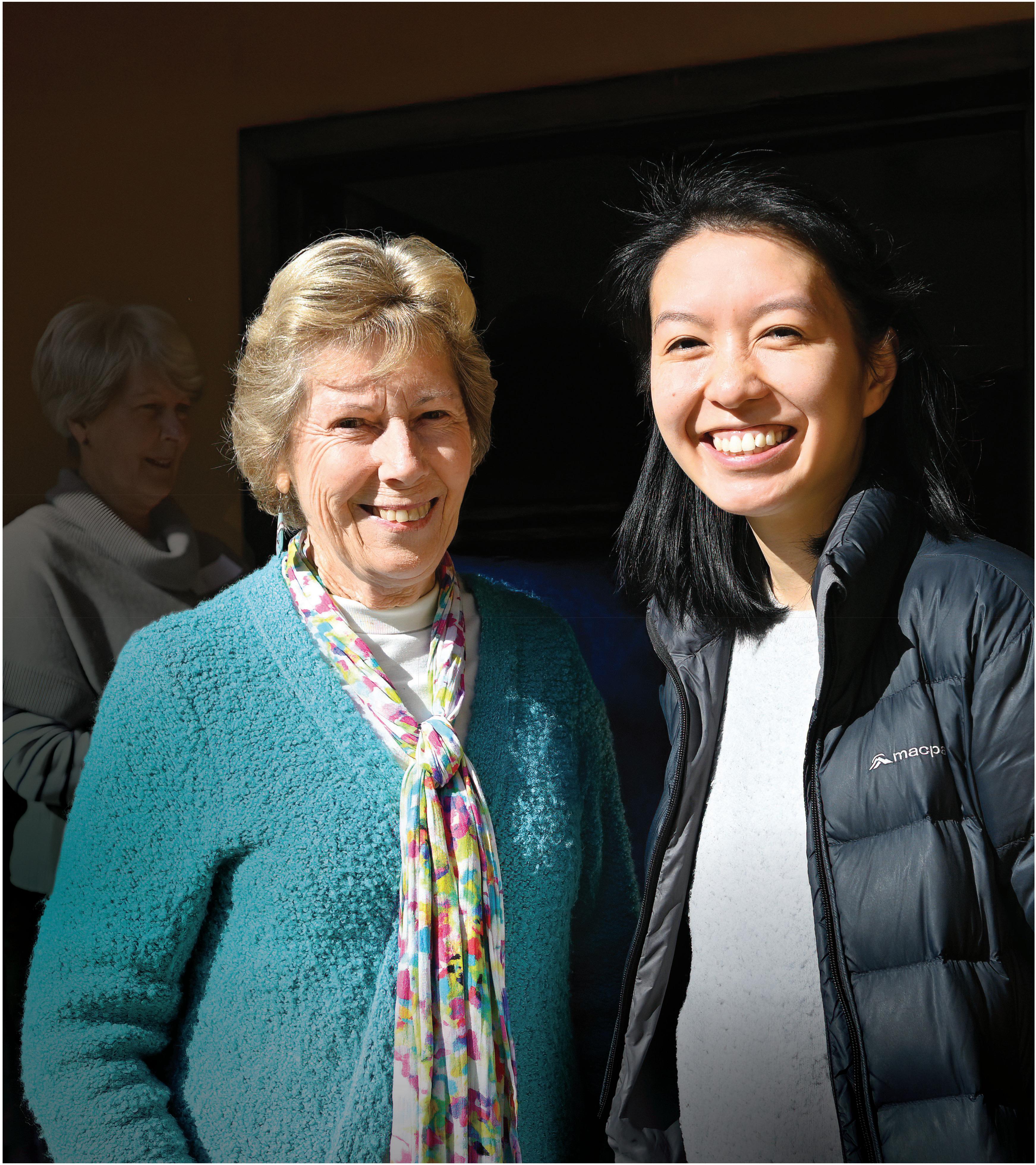


Mark D. Thompson / Principal
t is not the only thing we can say about him, and it is not the only thing we must say about him. He is majestic and glorious, holy and righteous, almighty and terrifying in the face of sin and its consequences, and yet is compassionate, merciful and forgiving. Even the Apostle John, in his first letter, in which he repeatedly says “God is love” (1 John 4:8, 16), does not forget that “God is light” (in fact that’s the first thing he says about God in that letter, 1:5). “God is love” should never be isolated from all those other things God has revealed about himself. Nevertheless, God’s very nature in eternal triune, other-centred fellowship ensures we give a special place to the recognition that God is love. The Father loves the Son from all eternity, and that love has always included the Spirit as well.
The Apostle Paul reminds us that “all things were created through [his beloved Son] and for him” (Col 1:16, 13). We can therefore think about the entire creation as the Father’s love gift to the Son.
The creation is the arena in which the Father will glorify the Son (John 17:1). It is in this context that the Son is God’s gift of love so that his human creatures could be saved: “God so loved the world, that he gave his only begotten Son …” The entire Bible testifies to God’s love in creation and redemption, and in bringing all things to their magnificent climax at the end, with the risen and triumphant Jesus at the centre of it.
Jesus himself is the great exemplar of God’s love: “God shows his love for us in that while we were still sinners, Christ died for us” (Rom 5:8). Jesus said, “As the Father has loved me, so have I loved you” (John 15:9). His love and the Father’s love is, in fact, the same thing.
Jesus’ love is demonstrated in the way he healed the sick, released the oppressed, gathered
the children, forgave sinners and raised the dead. His love led him to be moved with compassion, to grieve at the devastating consequences of a fallen world, and to walk resolutely to the cross.
“See how he loved him”, they said of Jesus as he stood outside Lazarus’ tomb (John 11:36). “See how he loves us”, we echo as we consider the cross, the tomb, the resurrection and the defeat of death.
It is unsurprising in the light of God’s own loving nature, his love of his creatures even in their fallen condition, and the demonstration and explanation of his love in Jesus, that God’s love is meant to characterise his people. A new commandment I give to you, that you love one another: just as I have loved you, you also are to love one another. By this all people will know that you are my disciples, if you have love for one another (John 13:34–35).
Love like this is not something we manufacture. It is the natural outcome of the Spirit’s work in our lives. The fruit of the Spirit in the lives of believers begins with love (Gal 5:22). Paul wrote that while faith, hope and love will remain, “the greatest of


God’s word is worth loving (Ps 119:37, 113, 163); and, following Jesus’ own example of humility, we should count others more significant than ourselves (Phil 2:3). But what does such love look like?
True love in Christian ministry is othercentred. It seeks the welfare of the other. We can stretch that right across these three loves: we love God as we seek to have him honoured as he deserves to be; we love God’s word as we demonstrate its trustworthiness, proclaim with bold confidence its message of salvation, and call for the obedience it deserves; and we love God’s people as we point them to Jesus and the salvation he brings, and as we help them continue to grow in Christ throughout their lives. Christian ministry means serving others, it is shaped by their needs, and desires above all to help them know and grow like Christ. It involves remembering the value that Christ himself placed upon their lives—he went to the cross to save them— and that we must give an account for how we have cared for them.
True love in Christian ministry bears whatever cost in order to serve God’s people. Other centred love is not preoccupied with our own sense of worth or the esteem in which we are held by others. It is prepared to be unknown and unrewarded. It both guides and guards Christ’s flock entrusted to our care, knowing this means we must be prepared to suffer loss for the sake of Christ’s people. It does not seek its own comfort or ease but that those we serve will stand among the faithful on the day that Jesus returns.
Finally, true love in Christian ministry points to Jesus. He is the only one who can save people. It is not our cleverness in presenting the gospel, nor our finely tuned ministry strategy, nor even the quality of the church experience we create that gets beyond the eyes and ears to penetrate the heart of a person. Only Jesus can do that: as his Spirit opens people’s eyes, minds, wills and hearts and enables them to call on Jesus as Lord and turn to God as our Father. The gospel
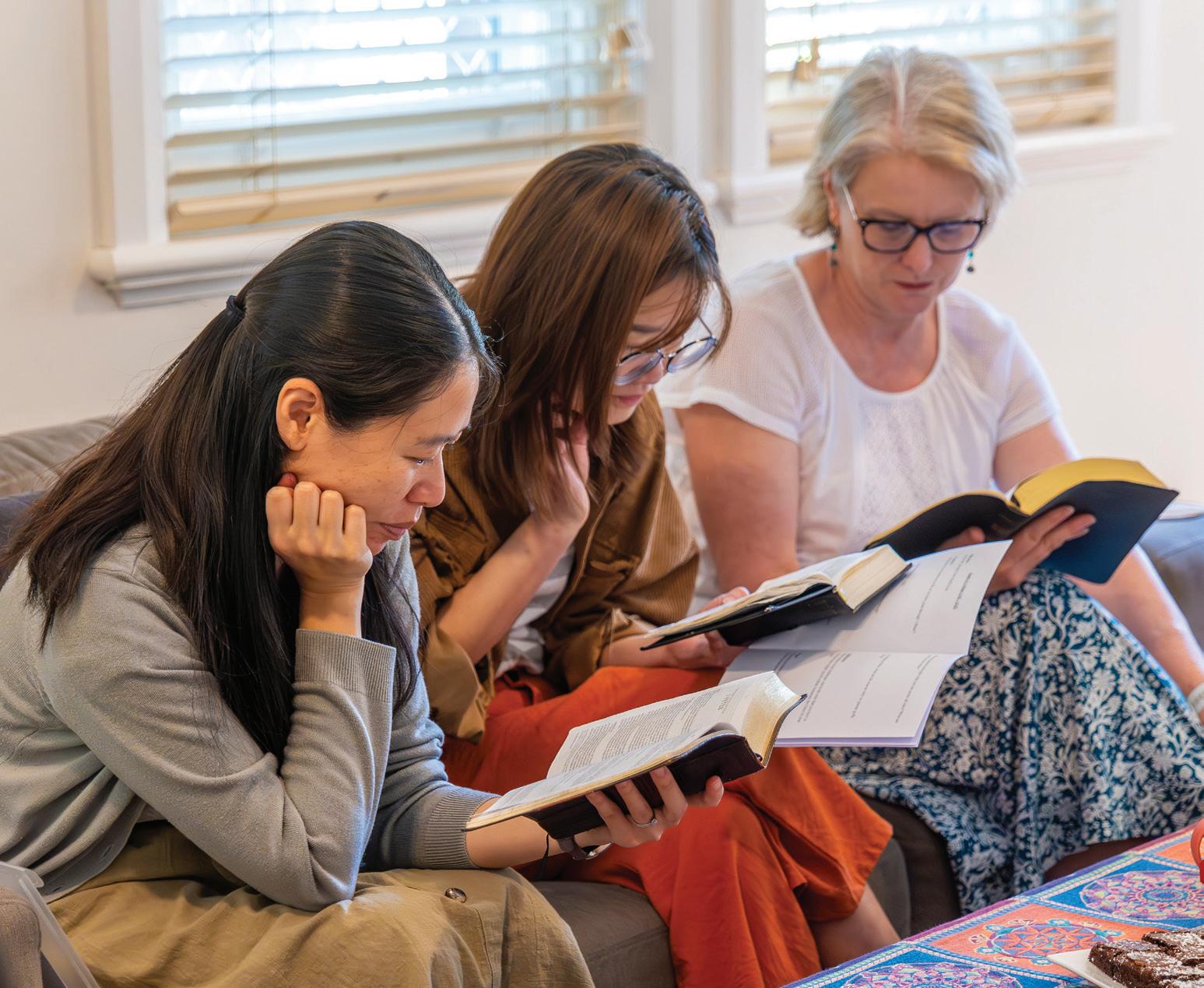
we proclaim is, first and foremost, the gospel “concerning his Son” (Rom 1:3); the strategy he has given us is to “make disciples of all nations, baptising them in the name of the Father and of the Son and of the Holy Spirit, [and by] teaching them to observe all that I have commanded you” (Matt 28:19–20); and the model church experience is that of the early church—followers of Jesus devoted to “the apostles teaching and the fellowship, to the breaking of bread and the prayers” (Acts 2:42).
What you are going to see in this edition of Moore Matters are examples of love. This love shows itself in different places, different contexts, and in the lives of different people. Yet it will have this common character: springing, ultimately, from God’s own character, his love for his creation, and the love he showed through his Son, it is other-centred, it bears any cost, and it points to Jesus. I hope you enjoy reading. M M
“
OTHER-CENTRED LOVE IS NOT PREOCCUPIED WITH OUR OWN SENSE OF WORTH OR THE ESTEEM IN WHICH WE ARE HELD BY OTHERS; IT IS PREPARED TO BE UNKNOWN AND UNREWARDED.
”
Mark D. Thompson Principal
About Moore College
Moore College exists to train men and women to take the good news of Jesus Christ to the world. Since 1856, more than 5,000 students have graduated from the College and have been sent out by God. Moore College has equipped men and women to serve in over 50 countries across the World.
Moore Matters is the newsletter publication of Moore Theological College. Principal of Moore College » The Rev Dr Mark Thompson Editors » Jamie Telfer, Karen Beilharz and Heidi Combs
Art and Design » Lankshear Design
Moore Matters Copyright © Moore Theological College 2025 1 King Street, Newtown NSW 2042 Australia moore.edu.au | enquiries@moore.edu.au | +61 2 9577 9999 CRICOS #00682B | ABN 47 746 452 183
Steve Gardner / Senior Minister, St Paul’s Canterbury
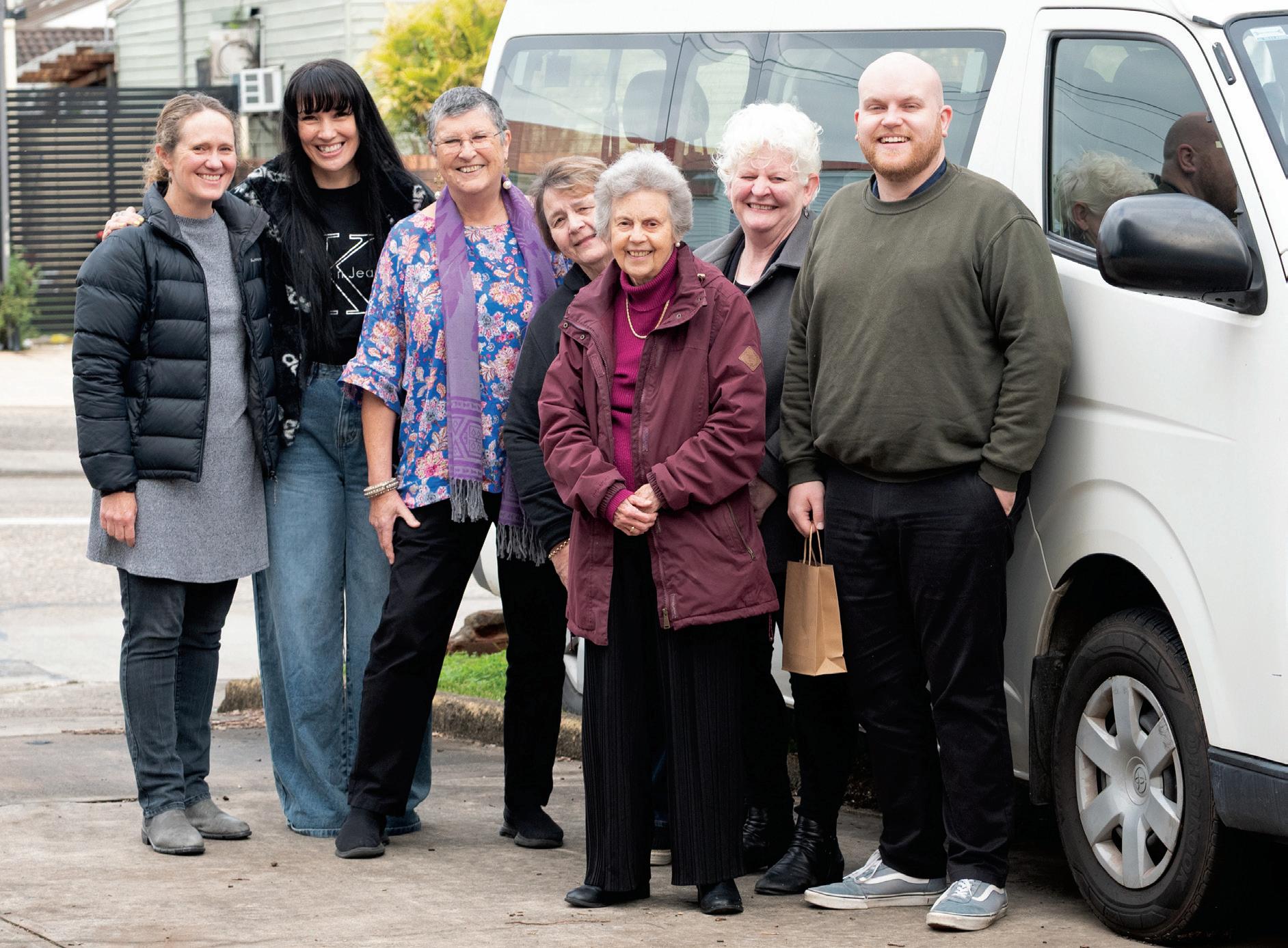

OVER THE YEARS, WE AT ST PAUL’S CANTERBURY HAVE OFTEN PRAYED THAT GOD WOULD GIVE US EYES TO SEE OUR NEIGHBOURS AND OUR SUBURBS THE WAY JESUS DID: WITH COMPASSION.
We have often asked him to grow in us a heart for the lost. So I don’t think it’s a coincidence that in our church, God has grown a particular concern for reaching some of our city’s most marginalised people.
“ WE BELIEVE THE MINISTRY OF RECONCILIATION GIVEN TO PAUL SHOULD CONTINUE TO SHAPE THE LIFE OF ORDINARY LOCAL CHURCHES LIKE OURS. ”
At St Paul’s, we talk about being a church for all people. That’s not a catchphrase or a cute vision statement, but a firmly held theological conviction earthed in the gospel. Paul’s words in 2 Corinthians 5 have greatly shaped our church’s approach to outreach:
So from now on we regard no one from a worldly point of view. Though we once regarded Christ in this way, we do so no longer. Therefore, if anyone is in Christ, the new creation has
come: The old has gone, the new is here! All this is from God, who reconciled us to himself through Christ and gave us the ministry of reconciliation: that God was reconciling the world to himself in Christ, not counting people’s sins against them. And he has committed to us the message of reconciliation. We are therefore Christ’s ambassadors, as though God were making his appeal through us. We implore you on Christ’s behalf: Be reconciled to God. God made him who had no sin to be sin for us, so that in him we might become the righteousness of God. (2 Cor 5:16-21)
We believe the ministry of reconciliation given to Paul should continue to shape the life of ordinary local churches like ours. Teresa Anderson, a longstanding member of St Paul’s, put it like this: “The more time we spend with God in prayer and meditation on his living word, the more God shapes our hearts to see others as he sees them—with compassion—which should lead us to serve others selflessly.”
As Christ’s ambassadors, we see the appeal to be reconciled to God as something that the local church does in word and deed. We proclaim the gospel of Jesus, imploring people to be reconciled with God, and we seek to offer them an experience of what new creation and reconciled relationships can look like.
Like many churches, we do that in a range of ways—in ministries like playgroups, food drives, kids holiday programs, English classes, and so on. But we also do this in two particular ministries to marginalised people: inmates and sex workers.
For eight years, we have worked with inmates from Long Bay Correctional Centre who come to our property to do general maintenance. We have a small team of church members who offer them real food and friendship. (It’s not a coincidence, but a tangible answer to prayer that when we asked for helpers for this ministry, Teresa put up her hand.)

We have been given many opportunities to share the good news of Jesus with these men, and often have been presented with opportunities to pray for them and their supervisor. It’s not uncommon for the supervisor to send us prayer points for himself and his inmates.
What impact is this ministry having? Teresa says, “I’ve seen our Long Bay friends’ hearts soften by our acceptance of them and us seeing them as equal before the Lord. Also, the majority of the community service workers admit to the consequence of their sin. It’s very humbling to witness this.”
We are also a part of a network of churches called Together for Canterbury-Bankstown Through this initiative, an opportunity arose to start a ministry to sex workers in our local government area. This ministry is called Rahab. Rahab Canterbury alone has 11 venues. Women from St Paul’s, St Alban’s Belmore and Embassy Church Punchbowl visit women in brothels on a Thursday morning, bringing gifts, and offering friendship and prayer. Rearne Gray, who leads the team and who serves at Embassy Church, shares,
The intention of the Rahab ministry is to become a gospel presence in the lives of sex workers within the local government area, since workers in this industry are among the most vulnerable and unreached in Australia.
The long-term goal of this ministry is to visit all willing establishments in the local government area regularly, to develop initiatives that meet the needs of women working in or adjacent to the sex work industry in Canterbury-Bankstown, and to mobilise Christian women across Canterbury-Bankstown towards ownership and engagement in ministries assisting the most vulnerable and marginalised women and children in our area.
So far, the team has distributed over 500 gifts and holds ongoing visits with around 50 vulnerable women. Only once have they ever been turned away. The team has had opportunities to pray with women, share Jesus with them and hand out Bibles. Our hope and prayer is that through the witness of ordinary local churches in our area, many of these women might come to know the light and love of Jesus.

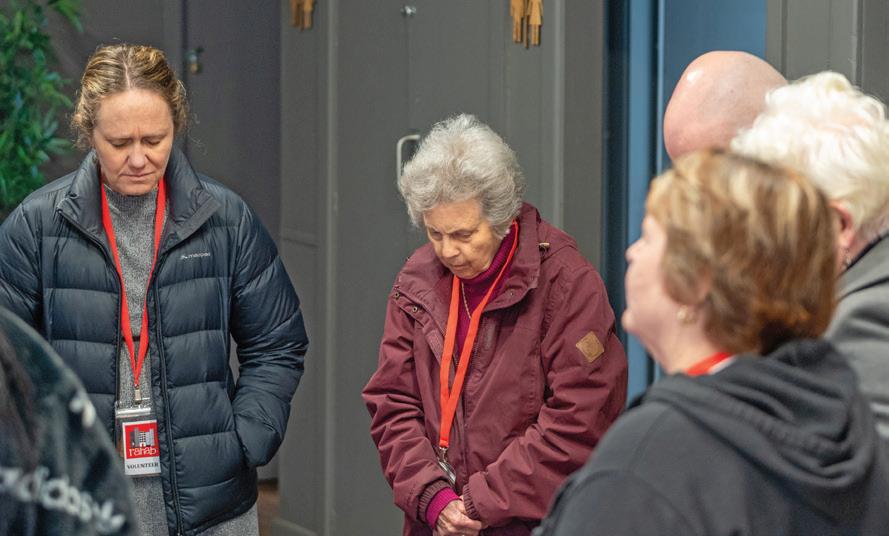

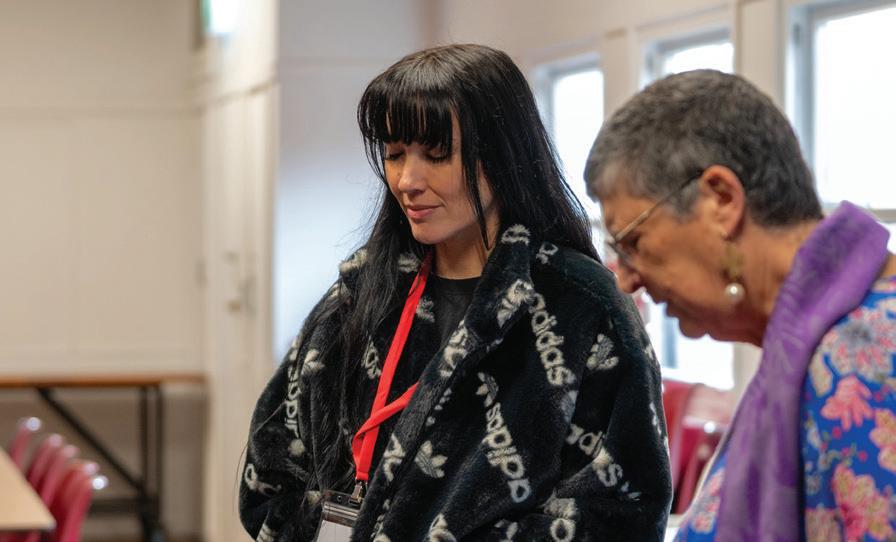
We asked God to give us eyes to see our suburbs as Jesus would. He is answering that prayer and giving ordinary saints the courage and creativity to reach the lost. These ministries are not easy (no ministry is), but they’re very simple: it’s the people of God demonstrating love in practical ways and sharing Christ’s love with others. M M
• Thank God for answering the prayers of the saints at St Paul’s Canterbury and for the amazing work he is doing in the lives of Long Bay Correctional Centre inmates and sex workers in the Canterbury-Bankstown local government area.
• Ask God to sustain the teams who work in these ministries and bless them with wisdom as they demonstrate his love to the lost.
• Ask God to raise up more workers for these rich harvest fields.
◂ Left column image: Steve and Teresa in the church grounds at Canterbury, which are maintained in part by inmates from Long Bay Correctional Centre.
Sandy Grant / Dean of Sydney and Rob Elder / Community Chaplain at St Andrew’s Cathedral Sydney
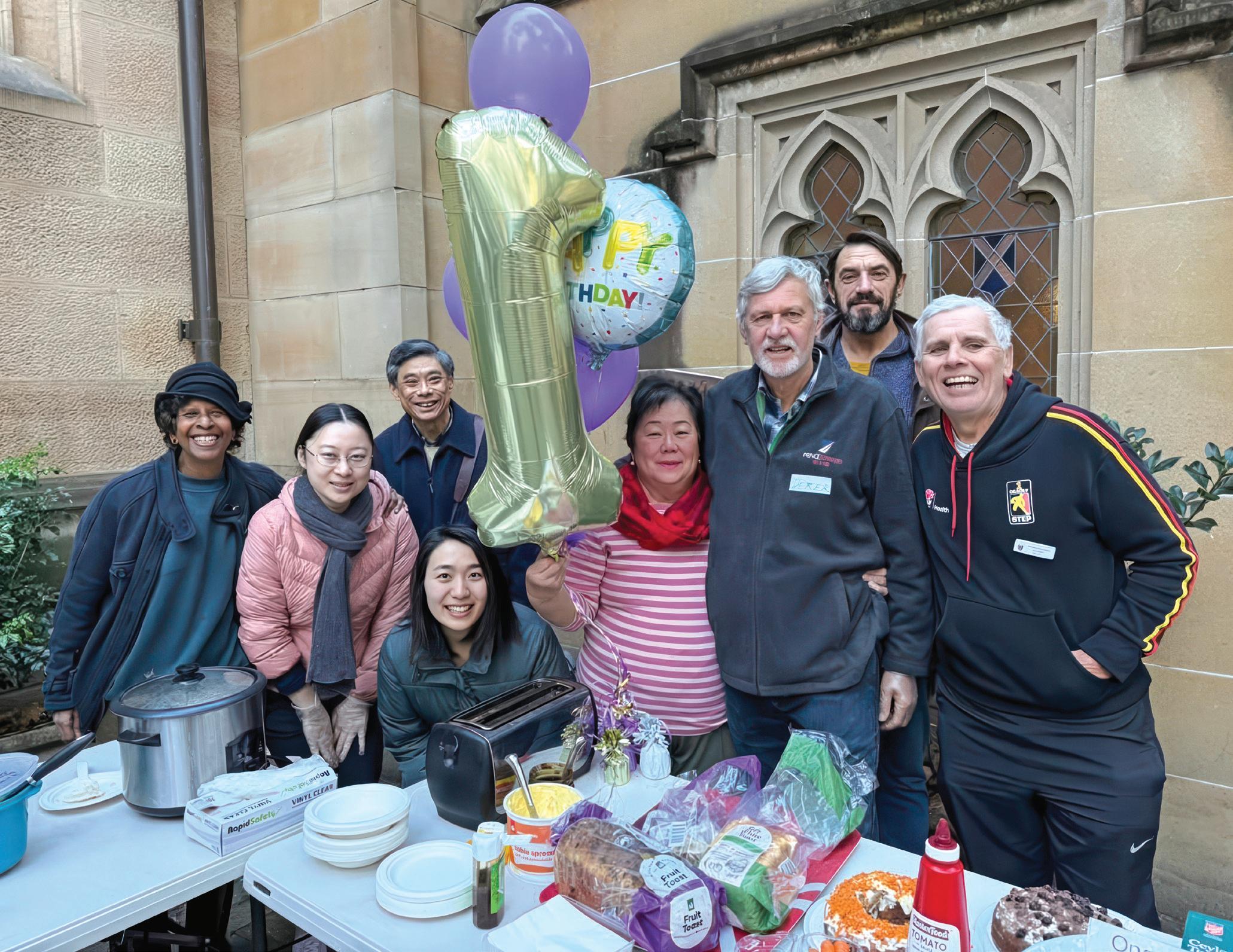
T volunteers
▸ Top Right: Rob Elder and a member of the Street T ministry.
▸ Middle Right: Breakfast, Bibles and buddies at the Street T ministry.
▸ Bottom Right: The Orange Sky laundry visits St Andrew’s Cathedral forecourt every Monday.
ST ANDREW’S CATHEDRAL HAS ALWAYS PLAYED A SIGNIFICANT ROLE IN SYDNEY CARING FOR THE NEEDS OF THE SURROUNDING COMMUNITY.
During and after World War II (1940-1947), approximately 3.5 million meals were given to active and returning soldiers in temporary Nissen huts erected on Cathedral grounds— the combined efforts of approximately 900 volunteers working for the Church of England National Emergency Fund (CENEF).
Over the last couple of decades, like many other church communities, the Cathedral has offered free English classes to serve the needs of overseas migrants and visitors. Bible reading is included as part of the approach—very appropriately, since the Bible and its message is so influential on our language, laws and culture.
Most recently, we have been especially delighted with the impact of Reverend Rob Elder



on our ministry. Rob, a Moore College graduate, was appointed Community Chaplain at the start of 2024, and his position is funded by the Myfanwy Peters Estate for the relief of the needy in CBD of Sydney.
The idea for his role flowed out of the vision of our previous Dean/now Archbishop Kanishka Raffel, and the motivation behind it is expressed well in 1 John 3:16-17:
This is how we know what love is: Jesus Christ laid down his life for us. And we ought to lay down our lives for our brothers and sisters. If anyone has material possessions and sees a brother or sister in need but has no pity on them, how can the love of God be in that person?
Rob’s first initiative was Street T. With a team of around 30 hard-working volunteers and chefs, who are a great credit to the Lord in whose name they serve, Street T provides “breakfast, Bible and buddies” on Monday and Tuesday mornings. Street T aims to reach those living on the streets and on the margins around the CBD—many of whom find themselves in our Cathedral forecourt. In its first year, Street T served up about 3,000 cups of coffee, 1,500 pieces of fruit, 1,000 bowls of porridge and 90 Bible studies.
Our goal with breakfast is to provide something nutritious, yummy and warm. This includes homemade food supplied by volunteer chefs from our congregations.
After food, we read the Bible and share a prayer. Reading and discussing the Bible together is a special joy: Rob says, “I’ve really loved listening to God, the occasional debate or new insight, and spurring each other on as we seek to apply his word to our lives.” One year in, we’re only about a third of the way through Luke’s Gospel, so we guess we’ll be finished around our third birthday.
Among our members, there is a notable level of hunger and interest in Christian faith. Many are curious about faith and, sometimes, they have a deep faith in Jesus themselves. It’s been a great joy for us watching a community of love (in all its quirkiness!) taking shape.
As we serve up the porridge, have a chat or share a prayer, we do so in a spirit of friendship. Of course, not everyone is chatty first thing on a Monday morning, and occasionally someone rubs us up the wrong way. But we thank God for the development of a genuine sense of friendship. We’ve loved getting to know our community members; there is no community without them! Our lives are richer as a result of knowing them, and it’s a joy not just to serve them, but to hear their opinions and to pray with each other.
We have also become a place for mobile community services to visit. The Orange Sky Laundry, a free mobile laundry service devoted to supporting people experiencing homelessness and hardship, drops in on Monday mornings. The 4 Voices van for women in crisis comes on Tuesdays.
In addition, once a month, we host a community hub in partnership with the Salvation Army. Our volunteers offer an additional early lunch sausage sizzle and cuppa, while a dozen or more government and community services set up pop-up access points in the Cathedral forecourt. Organisations involved include Anglicare; GambleAware; Homes NSW; Legal Aid; Births, Deaths and Marriages; the Ombudsman; People with Disability; Services Australia; Short Back & Sidewalks (who give free haircuts to people experiencing homelessness and poverty) and St Vincent’s Hospital Homelessness Team. We are so grateful for the common grace displayed in these community services consistently turning up, even in the cold months and on rainy days, so that people off the streets and on the margins can access practical help.
In 1 John 4:10. we read, “This is love: not that we loved God, but that he loved us and sent his Son as an atoning sacrifice for our sins.” This is an extraordinary love: God’s love for us in Jesus takes away our sins and frees us to live a whole new way. As the passage continues,
Dear friends, since God so loved us, we also ought to love one another. No one has ever seen God; but if we love one another, God lives in us and his love is made complete in us.
(1 John 4:11-12).
We pray that through the ministry of Street T, many will experience something of this transforming love of Jesus. M M
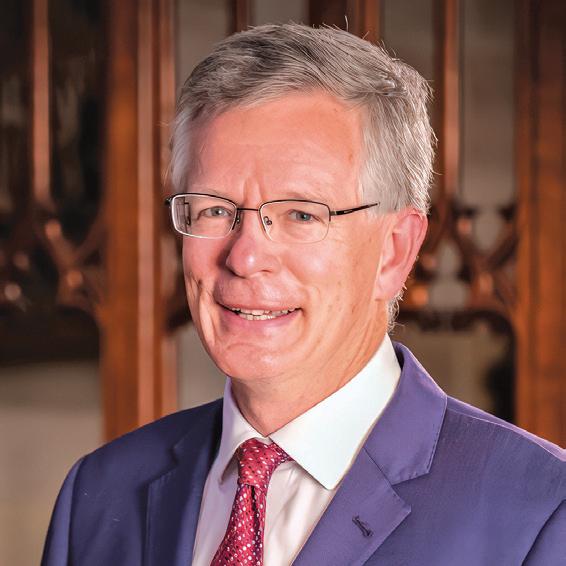
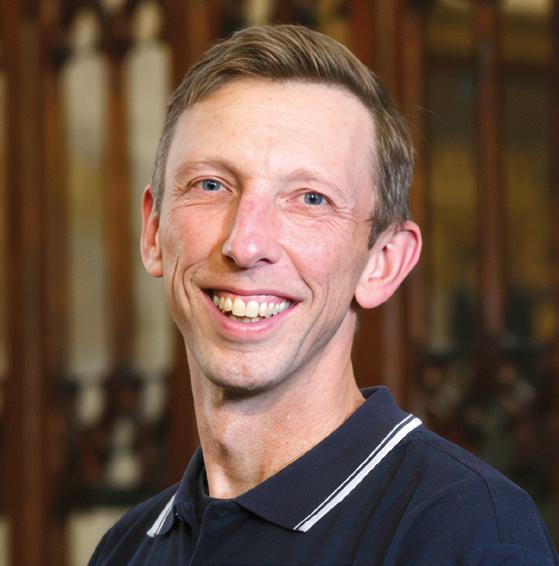
• Thank God for the ministry of Street T, for their volunteers and for the various connections they have made with their community in their first year.
• Ask God to bring help, hope and healing to those living on the streets and on the margins of Australian society.
• Ask God to reach many with the transforming love of Jesus so that their lives will be changed.
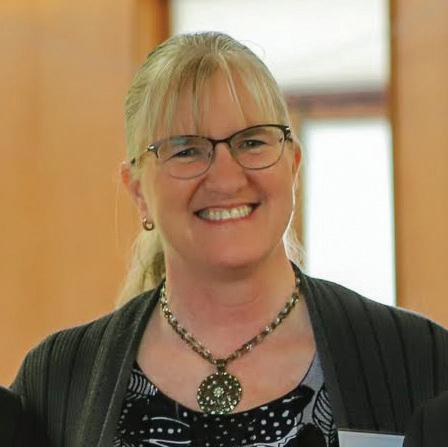
Kathryn Thompson is married to Mark Thompson, the Principal of Moore College since 2013. Mark and Kathryn have been part of the College community since Mark joined the Faculty in 1991.
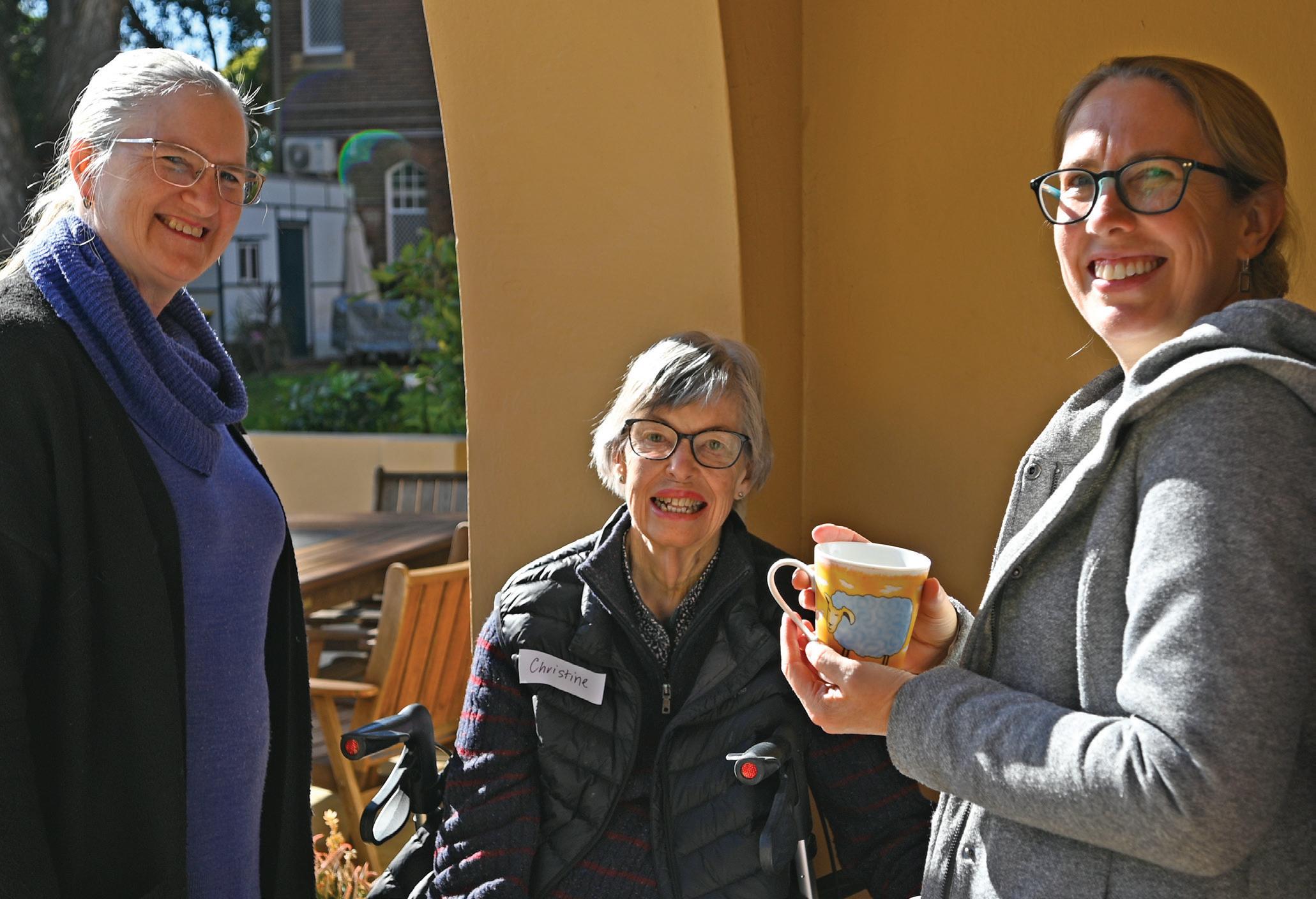
OVER MANY DECADES, A GROUP OF GODLY WOMEN HAS BEEN MEETING REGULARLY IN NEWTOWN TO PRAY TOGETHER.
They pray for the College, its students, Faculty and staff, and their prayers are a labour of love, creating deep bonds of fellowship, as these women unite in their desire to see Christ’s gospel proclaimed throughout our world and the College resourced to play a critical role in that.
What began as the Women’s Auxiliary in the 1940s was rebranded by Christine Jensen in the 1990s to become the Prayer and Support Group. It originally helped furnish student rooms (a number of the doors in what is now John Chapman House still have Women’s Auxiliary plaques on them) but with the growth of the College, the practical needs of the students
became the responsibility of administration staff. So, the group came to focus solely on prayer support for the College, hence the name change to the Prayer Support Group.
These days, this group is quite diverse: it includes current and former Faculty wives, current and former student wives, parents of current and former students, those involved in ministries that send us students, and others who are simply convinced of the importance of supporting the College in prayer—it even includes the wives of several archbishops! Some members have been part of this group for 50+ years; others are newer. All recognise that God chooses to act when his people, “in everything by prayer and supplication with thanksgiving let [their] requests be made known to God” (Phil 4:6).
Some of these women have shared the following thoughts about this “very precious Prayer Support group”:
“[We come] to College to pray with friends and students who know and love our Lord Jesus and want him to be known, not just in Sydney, but to the furthest corners of Australia and to ends of the world. [We do so] recognising our absolute dependence on our loving heavenly Father who delights in His children coming to Him in prayer. Seeing our prayers answered, often beyond our expectations, encourages us immensely.”
—Mary O’Brien (former Faculty wife)
“I think one of the most powerful things Christians can do is to gather together and pray. So I want to prioritise meeting with the women who are part of the Moore College Prayer Support Group to learn about the needs of the College and bring them before our heavenly Father together in prayer. If we want to see God’s kingdom grow
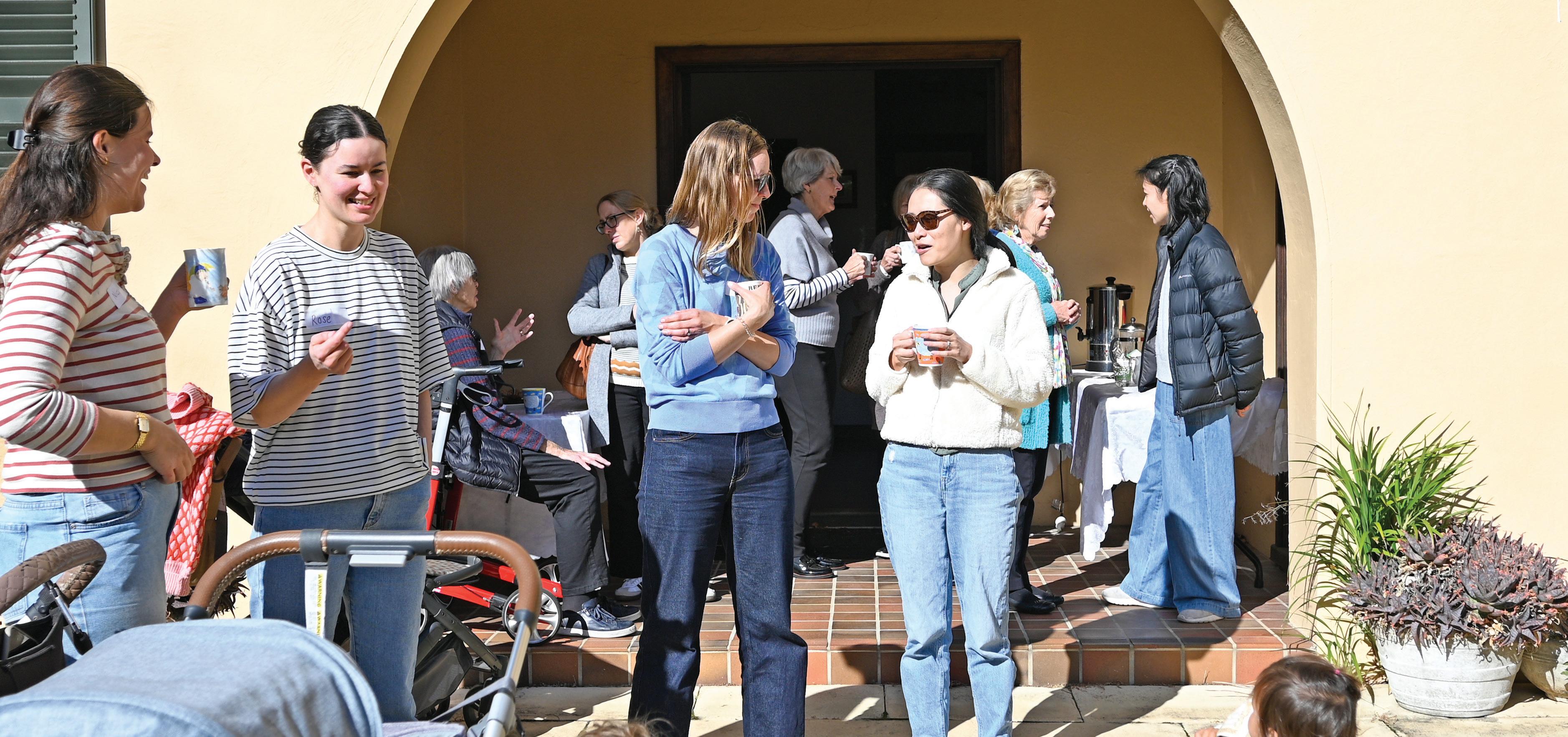
in Sydney and beyond, we need to see gospelfocussed servant-hearted men and women going out into the world and so it’s important to pray for them and for those who train them.”
—Victoria Colgan (former student and student wife)
“I’ve always known that the work of the College is a great work of God in our Diocese and far beyond. For almost 50 years, I have had the privilege of joining in prayer in fellowship with a wonderful group of women for the needs of the College—especially that the Lord will continue to raise up men and women to be faithful teachers of his Word.”
—Christine Jensen (former student and former Principal’s wife)
God has provided richly for the College in answer to the prayers of these women. He has brought students to the College, supplied the teachers and administrative staff we need, provided us with wise and skilled governors, built and strengthened the links between the College and the churches we serve, and year after year, he has sent out College graduates to ministries all over the world. Furthermore, he has also grown the fellowship of this amazing group of faithful women as they have lovingly continued, year after year, to pray. M M
To find out more about the Prayer Support Group visit moore.edu.au/events/. Even if you are unable to attend, we value your prayers on behalf of the College: find out more about how to pray for the College regularly at moore.edu.au/support-moore/prayer/.
Sharing a time of devotion and prayer points ▸ signals the start of the formal time together, then prayer in earnest begins in small groups.
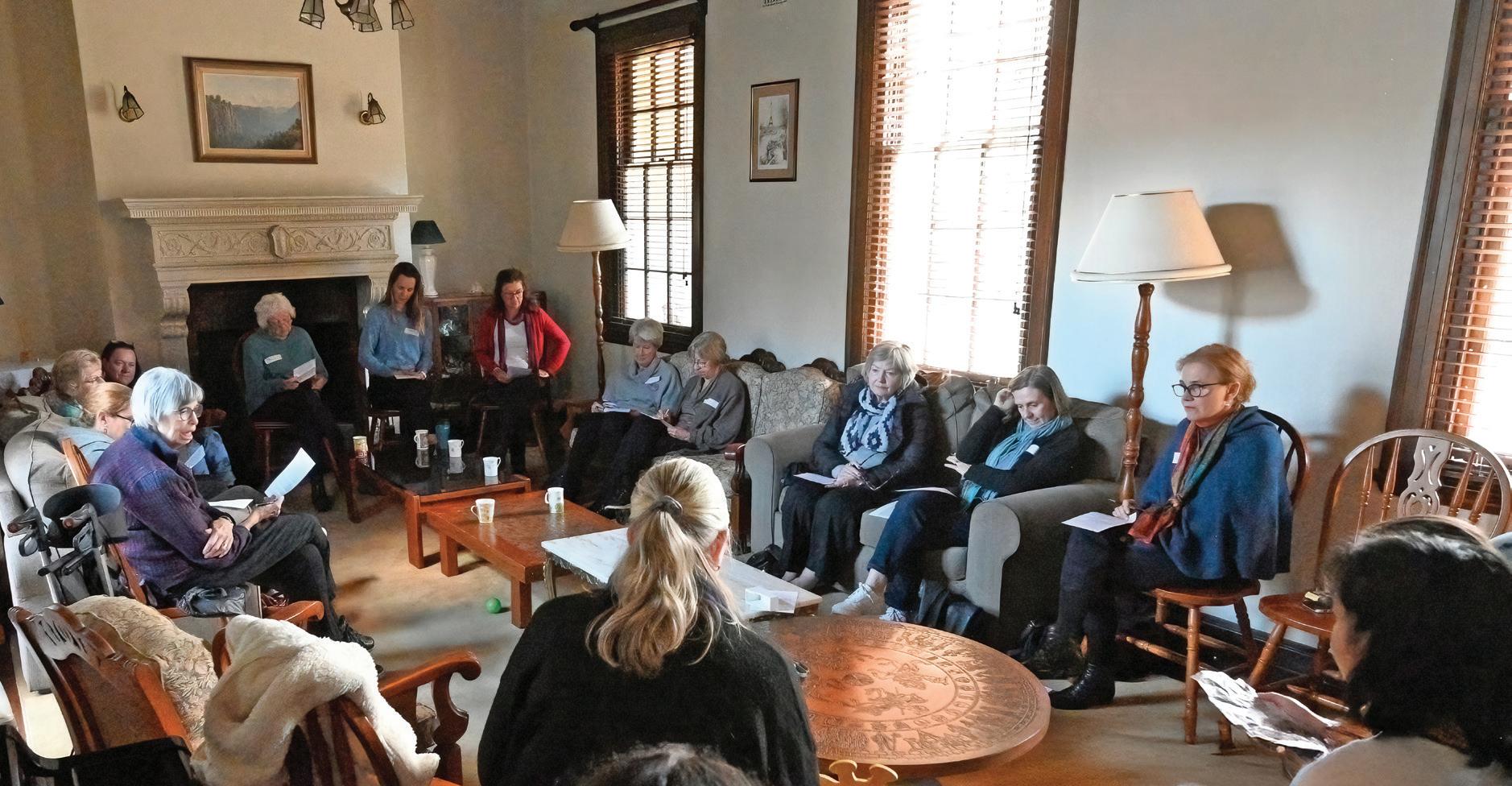
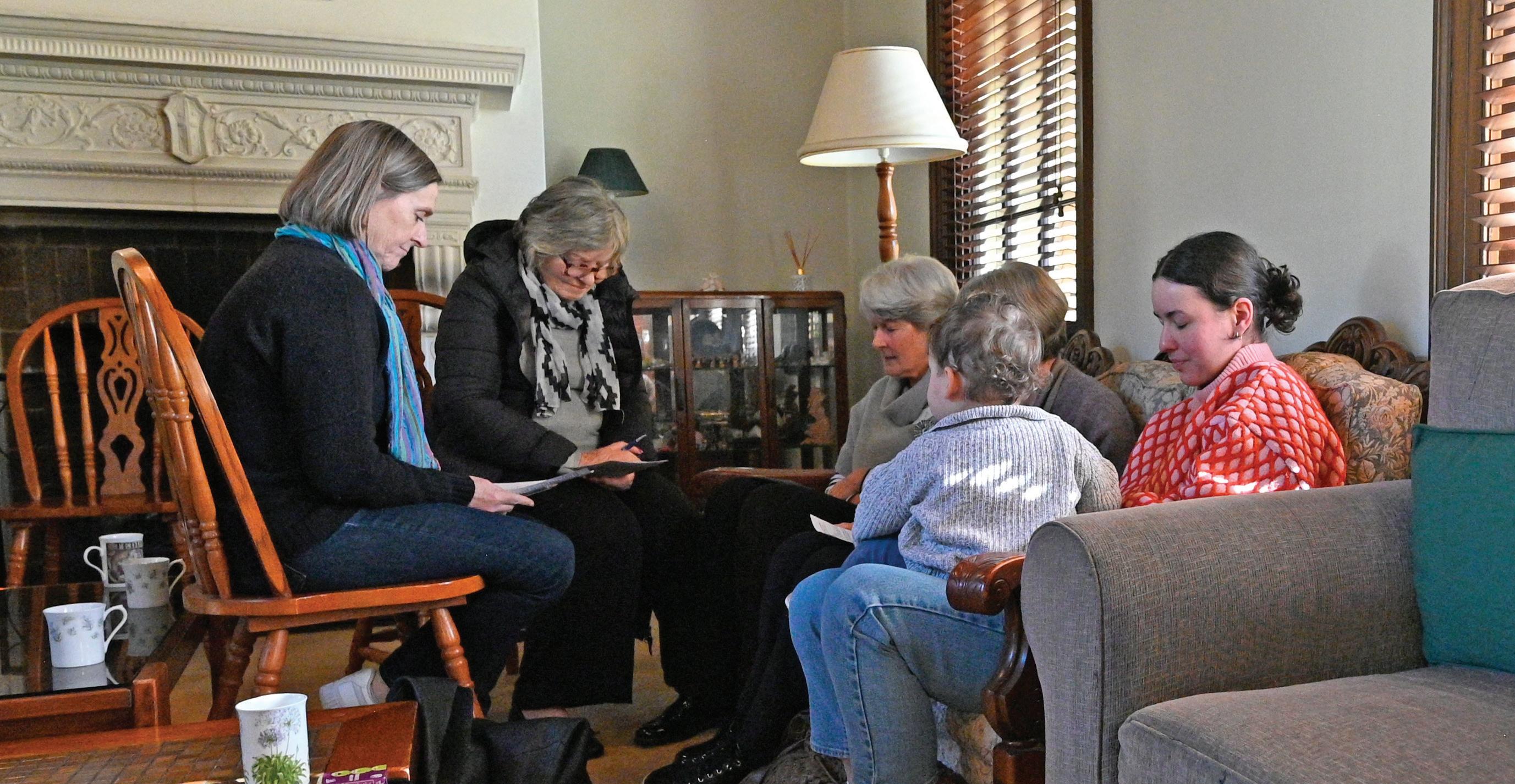
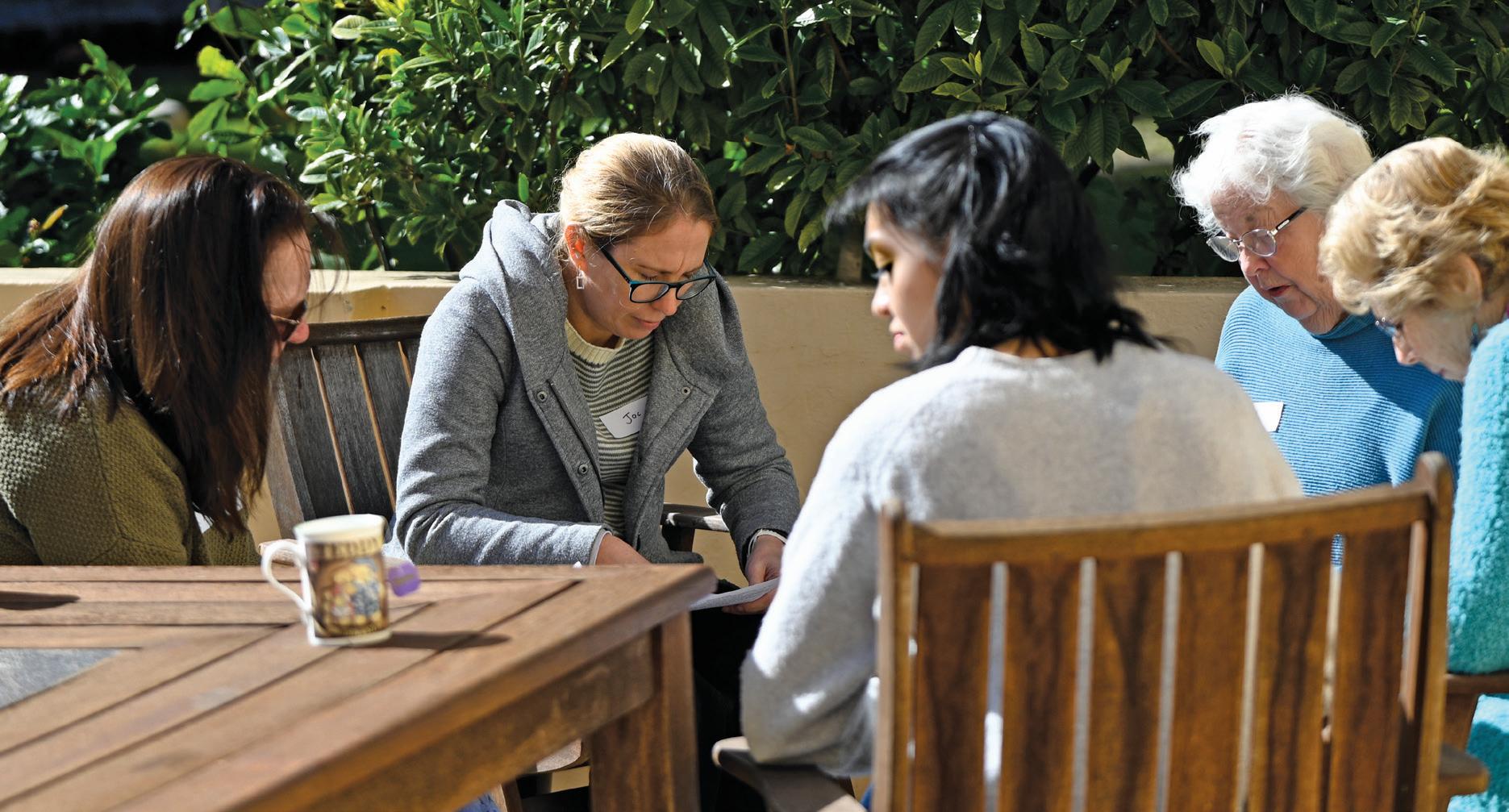
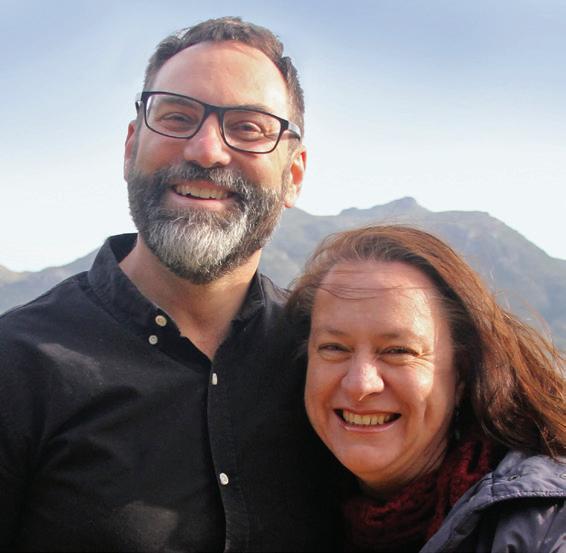
HERE AT MOORE, WE WANT TO BE AS HELPFUL AS WE CAN IN PREPARING STUDENTS WHO ARE MARRIED TO LOVE THEIR SPOUSES WELL AND TO INVEST IN THEIR MARRIAGES—FOR THE GOOD OF THEIR FAMILIES AND FOR THE GOOD OF THE CHURCH.
This love needs to be nurtured and informed. While this is true for every marriage, there are some additional pressures, expectations and joys that come to married couples in Christian ministry.
Christian husbands and wives are to love one another in response to, and in reflection of, the love that Christ has for the church (Eph 5:22-33). The connection between the household of God, the church, and the household of Christian leaders is of utmost importance for ministry. The qualifications for overseers describe life of the leader’s household and many of the characteristics expected of leaders will be seen most clearly in their homes and marriages (1 Tim 3:1-7).
To raise the stakes even further, there is a clear and deliberate blurring of what we might consider the public and private lives of Christian leaders. How a leader is in their marriage and at home determines how they are viewed by those inside the church, who watch their lives closely (1 Tim 4:11-16), and also the reputation they have among outsiders (1 Tim 3:7). A person who struggles with selfcontrol, drunkenness or any kind of violence at home is not qualified
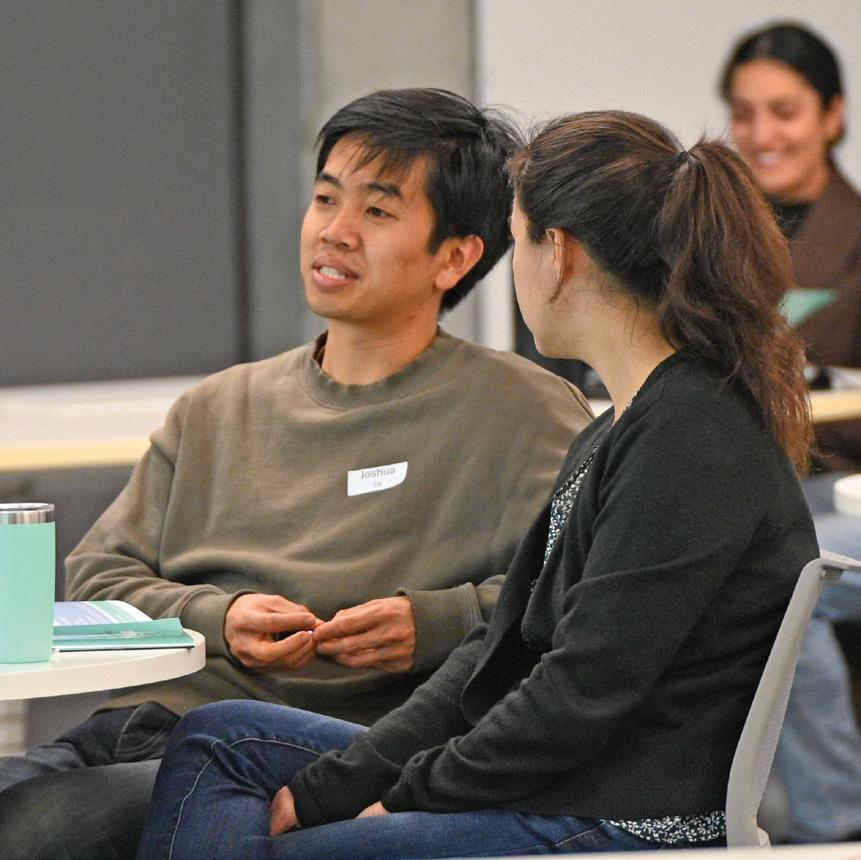

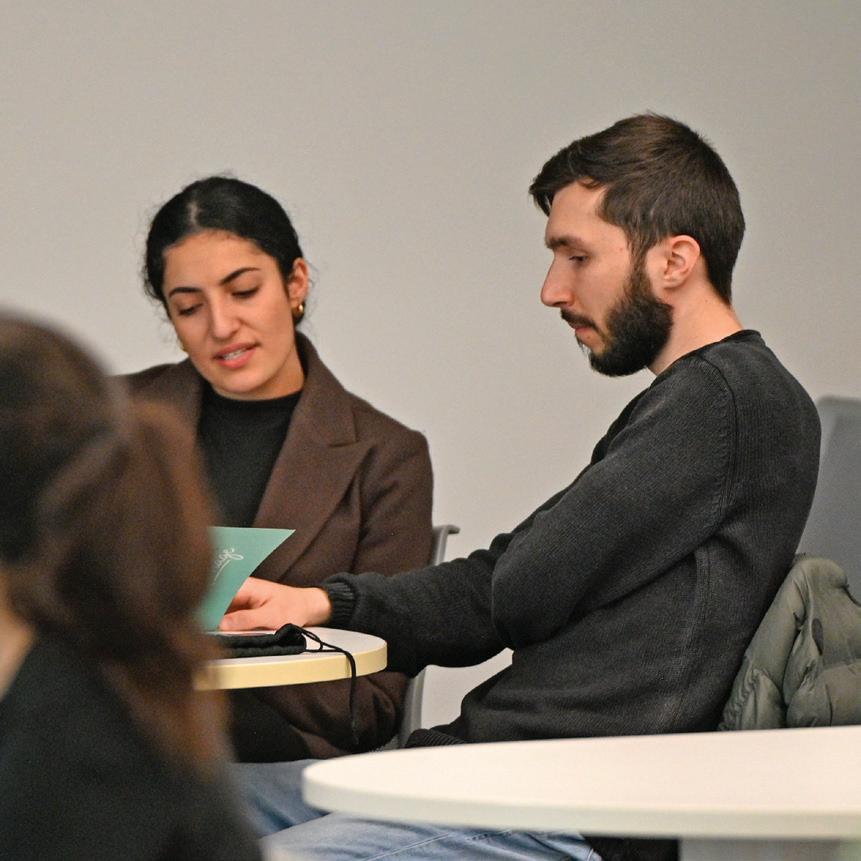
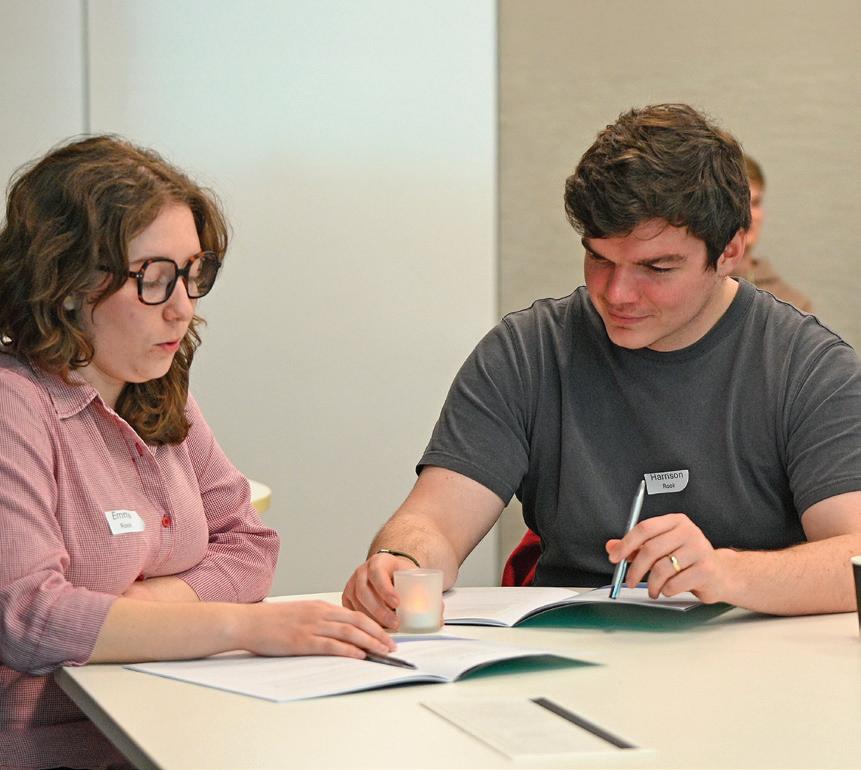
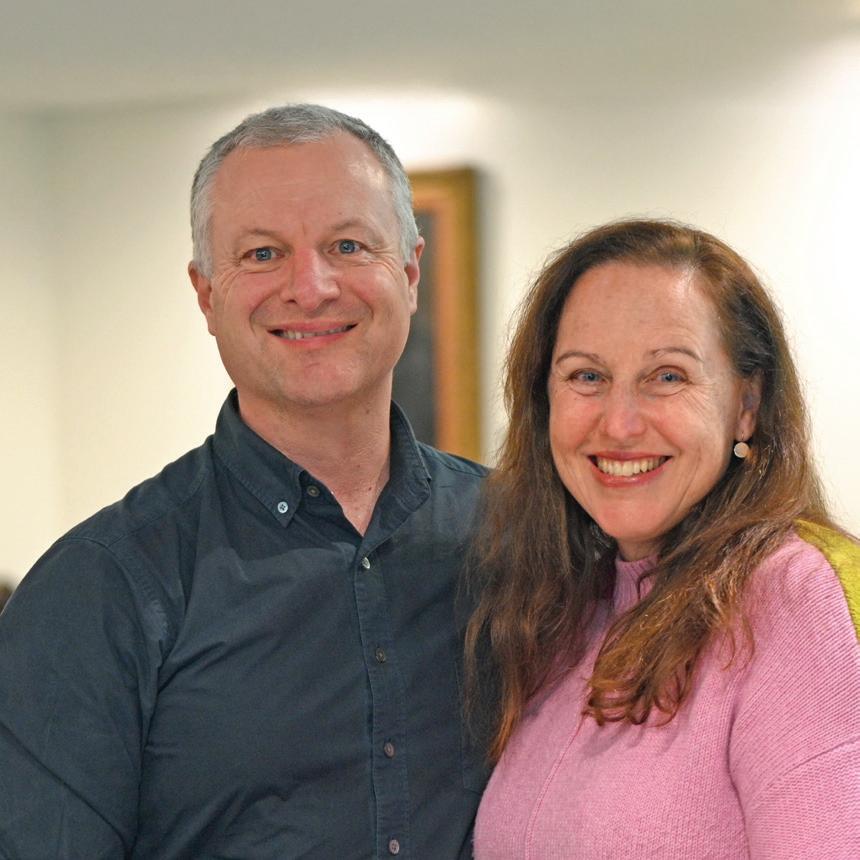
to exercise public ministry. Our marriages and homes should be places of gentleness, hospitality and care. In this way, the home of the leader becomes a place from which ministry can be extended.
We love being married and have loved doing ministry together for more than 30 years. One of our great joys at College is meeting with couples and talking these things through in a variety of casual and more organised ways. Part of the genius of College community is that we all get to learn from and encourage one another as we do life side by side.
We are also part of a team of Faculty couples who run a few different organised programs for marriage enrichment. These include an evening to help new students think about how their marriage can thrive at College; a five-night program to develop healthy and resilient marriages called Building a Safe and Strong Marriage; and an evening for exiting students to think specifically about how to love one another well in marriage as they transition to full-time ministry and set habits and expectations for one another and their families.
Jesus is honoured and his gospel adorned when Christian husbands and wives love one another, following the model of love that he exercised. It is our prayer that the marriages of our College community will reflect the love that Christ has for his church. M M
◂ Mal York is Dean of Students at Moore College and together with Heather they helped lead the latest Marriage Enrichment Course for students.
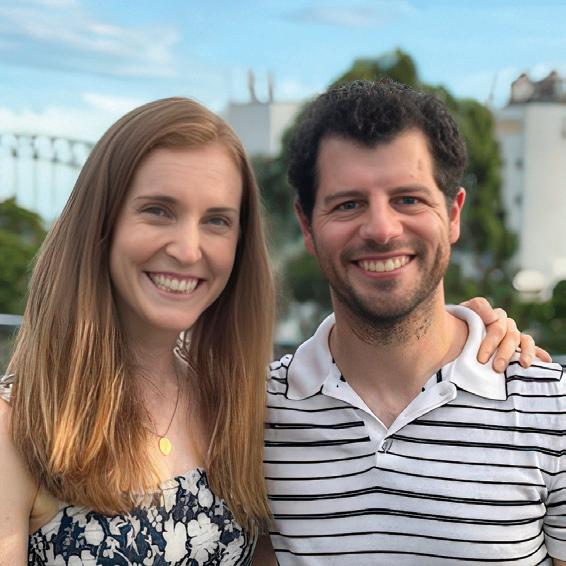
Joshua and Nikki Hesford / Ministering at St George North Anglican Church
art of being loving is the intentionality of our actions. In the context of our marriages, this can mean being intentional about working on our marriages. Prepare and Enrich-type courses are just such opportunities for this.
We all know we should carve out time to think carefully together about how our marriages are going in different areas. Enrolling in a marriage enrichment course actually makes it happen!
I now run these courses with couples myself. Yet I still occasionally take the time to invest in my own marriage by enrolling in them myself. I find that otherwise, important conversations can easily fall by the wayside.
In looking to love others, it is strategic to invest in our own marriages and make them great expressions of love. If you’re married, why not sign up for a marriage enrichment course yourselves? M M
“
WE ALL KNOW WE SHOULD CARVE OUT TIME TO THINK ABOUT HOW OUR MARRIAGES ARE GOING. ENROLLING IN A MARRIAGE ENRICHMENT COURSE ACTUALLY MAKES IT HAPPEN!
”
Although we felt that our marriage was strong, we saw the Building a Safe and Strong Marriage course offered by College as an opportunity for us to grow in our love and awareness together. This course certainly did that, and more! With clear foundations in the gospel and using helpful secular resources, the course helped us see how God intends marriage to be.
Over the five nights, we received helpful language and questions to ask ourselves that enabled us to clearly understand and express where we were at relationally. The course also allowed us to express unidentified frustrations in our marriage that we didn’t realise we had, and to forgive one another for them. We are thankful for God’s love towards us as he perfectly modelled for us the greatest act of forgiveness and love.
The course was not without its challenges: one part focused on six warning signs of a marriage in trouble, and it was confronting to realise that our marriage had teetered into areas characterised by some of these signs. We realised that unless we addressed them, things could escalate further. It was a humbling moment for us both, and we reflected on how we might have taken on certain habits subconsciously, as well as
how we can address them in future situations with an attitude of love and grace.
For anyone considering doing this course, we recommend it. Another couple who did the course with us at the same time shared that it was their second time completing it: they had first done it four years ago, and wanted to do a refresher—especially given their marriage had changed since having a child. This encouraged us and has motivated us to redo the course when we reach our final year of College.
Building a Safe and Strong Marriage provided us with a very safe and non-confrontational space to investigate our marriage honestly. It’s helped us see God’s commitment to us, which has strengthened our commitment to each other. It’s helped us grow in our awareness of the little interactions throughout our days in which we can grow in love. It’s left us with several helpful and practical steps that we continue to follow almost a year on.
We believe that the language, thoughts and questions in these studies will even serve us as we minister to other married couples under our care, once we enter full-time ministry. We strongly recommend this course to any couple who are married or even planning to be married. M M

Laura is studying the Advanced Diploma of Bible, Mission and Ministry part-time and is a part-time apprentice at MBM Parramatta. TJ is in his second year of the Bachelor of Theology.




“ IF WE THINK THE APPLICATION OF THE BOOK IS ALL ABOUT MARITAL LOVE, IT’S VERY DIFFICULT TO PREACH THAT IN A WAY THAT’S INCLUSIVE OF EVERYBODY.”
Kamina you completed a PhD on the Song of Solomon, have written books on it, spoken at conferences and generally thought deeply about the words, message and meaning of this book. It is a book that is not regularly on the preaching roster or even regularly referenced in Christian circles. Why is that?
So many Christians I speak to have never read the Song of Solomon and many ministers I talk to say they have never preached on it or even heard it preached. I suspect that people stay away from it because its interpretation is so contested. There’s no consensus on quite a number of significant issues – authorship, dating and even meaning. I also think maybe we struggle to see the relevance of it because it doesn’t explicitly talk about God and Jesus, and it doesn’t hook into the history of Israel in a very obvious way.
The sexual content of the book can also be a bit of a taboo topic. Preaching the Song to a mixed congregation can be challenging when you think about talking to youth and kids, single people, or people experiencing problems in their marriage.
One day at church I had a woman come to me and say, “I’m reading through the whole Bible from the beginning and I’ve gotten up to the Song of Songs and I don’t see why I should read it. I’m single and I don’t see what I could learn from a book that’s about two people being in love.”
If we think the application of the book is all about marital love, it’s very difficult to preach that in a way that’s inclusive of everybody.
The Song is unashamedly all about love, but I think you would agree that it talks about love at a number of different levels – from human love and marriage to the love of God and Israel.
A number of scholars would contend that the Song is only about human love—and a number argue that it’s only about God’s love—but I am convinced that the Song makes most sense in light of the story of Solomon. He is used as a negative example of both human love and relationship with God.
Solomon’s approach to ‘love’ is positioned in the Song as the antithesis of the main relationship between the woman and her Beloved. Solomon’s love for foreign women, as depicted in 1 Kings 11, is not portrayed as emotionally intimate. His relationships with his 700 wives are not committed, exclusive and monogamous. The Song, in contrast, shows us that God’s idea of good human love is an intimate, covenantal relationship, where there is no abuse of power.
We think of love as being inherently good, but the Hebrew Bible is full of examples of people loving something in a way that’s actually destructive – both to the people involved and to their relationships with God. The author of the Song uses Solomon as a cautionary tale. His love of foreign women led him away from God and had consequences which were really problematic for Israel. This is a warning for the reader of the Song: be discerning about who and what we love and how we love them.
It’s really helpful to remember that for the Israelites in the Old Testament world their choice of marriage partners and the way they acted in marriage, whether wisely or foolishly, was often very much tied up with their worship of Yahweh and how closely they followed Yahweh and walked in his ways and lived wisely for him. So it’s difficult to separate wisdom about sex and spirituality in the way modern thinkers are inclined to do. It’s about both.

The Song, along with the book of Esther, are the only two books of the Bible that don’t directly mention God. How does the Song teach us about the nature of God?
In chapter eight there is a cluster of poetic images that are strongly resonant with poetic imagery about Yahweh in other parts of the Old Testament. The poetry explodes out of its boundaries from being a poem about a man and woman and is now talking about God, calling us to cast our eyes towards Him.
Set me as a seal upon your heart, as a seal upon your arm, for love is strong as death, jealousy is fierce as the grave. Its flashes are flashes of fire, the very flame of the Lord.
I think it might as well say God’s love is as strong as death, God’s jealousy is fierce as the grave. God’s jealousy is a component of his love. He loves his people so much and he is jealous if they worship other gods.
This all-consuming fire, this ‘God-flame’ (Shalhevetyah in Hebrew), is very scary if you’re faced with it, but at the same time, the author says this love can’t be quenched by many waters. It can’t be drowned in floods. So, if you are shielded by that love, if you belong to God in that love, then you will be protected from enemies. (And ultimately, I think, from God’s judgement.)

moore.edu.au/phd
The Song talks at the end about God’s love in hyperbolic, poetic terms, and it reminds Israel: God’s love is so strong for you. It is big and beautiful and capable of protecting you, but his jealousy is this terrifying white-hot flame. It is a warning: be on the right side of that love.
When we have that picture of God’s love alongside the story of Solomon, I think it’s calling Israel to continued faithfulness. Be faithful to God because you want to be protected by that love. You don’t want to be counted among his enemies, so stay on the wise path. Keep guarding your hearts. Keep turning towards God. Don’t turn away from God the way that Solomon did.
It seems that you think it is important reading even if the metaphor used makes the reader, whether it is the minister preaching or the congregation listening, feel uncomfortable. The Song of Songs makes me feel uncomfortable! But it’s a piece of wisdom literature, and part of the way God teaches us his wisdom is to actively work in our hearts, making us think. The Song is aimed at making your heart feel something in order to transform your posture towards God. The discomfort has a purpose, and as people who know the transforming grace we have through Jesus it is worth meditating on. M M
“ GOD’S LOVE IS SO STRONG FOR YOU. IT IS BIG AND BEAUTIFUL AND CAPABLE OF PROTECTING YOU, BUT HIS JEALOUSY IS THIS TERRIFYING WHITE-HOT FLAME.”
AS GRAHAME AND PATTY SCARRATT, MISSIONARIES IN CHILE IN THE 1980S, FIRST TRANSLATED MOORE’S PRELIMINARY THEOLOGICAL CERTIFICATE (PTC) INTO SPANISH THEY COULD HARDLY HAVE REALISED HOW GOD WOULD USE THIS WORK.
Their first pupil in 1983, a young Chilean student, is today the Primate of Chile and credits PTC and the consequent growth of MOCLAM, a Spanish language theological training ministry, which offers accessible, yet high-quality theological education to Spanish speakers, with defining the “Anglican church in Chile as evangelical and reformed.”
“It has been a tremendous blessing for us in Chile, I’m sure it is for everyone who takes it and studies it. It gives rise to a love for the Scriptures, a love for the Word of God, a better understanding of the character of Christ, a solidity in faith and trust through what the Lord teaches us in the Scriptures” explains the Primate of Chile, Most Rev. Enrique Lago Zugadi.
The Moore’s Centre for Global Mission continues to partner with MOCLAM and today Moore graduates continue to teach through MOCLAM (all current MOCLAM workers are, with one exception, Moore graduates) and provide teaching resources. Moore College’s impact in South America has extended through the Ibero-American nations of Chile, Argentina, Mexico, Peru, Bolivia and Cuba.
“It is exciting to see lay leaders, pastors and university student leaders from across Latin America with a thirst to understand the Bible, signing up to study the Bible through MOCLAM courses which are based on Moore’s PTC.”
Rt Rev Malcolm Richards, Graduate 1986/1996, Bishop for International Relations and Director for Centre for Global Mission
As you read through the following stories you will get a glimpse into how God has worked through Moore College across generations to “give rise to a love for the Scriptures” throughout South America. This is a wonderful story of growth and transformation. M M
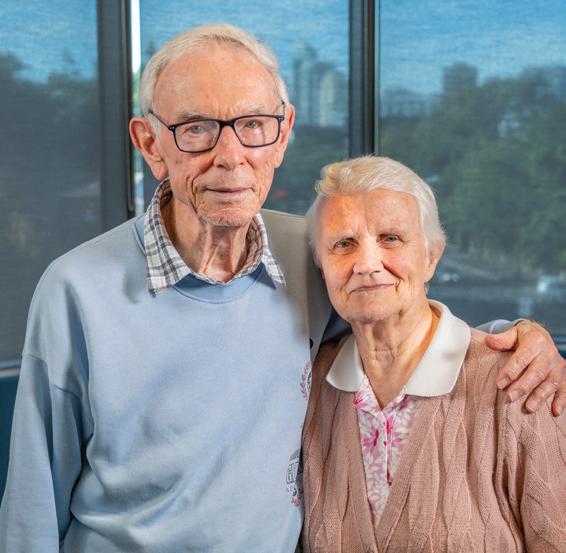
Grahame and Patty Scarratt
Missionaries to Chile (1980-1987; 1993-2010)
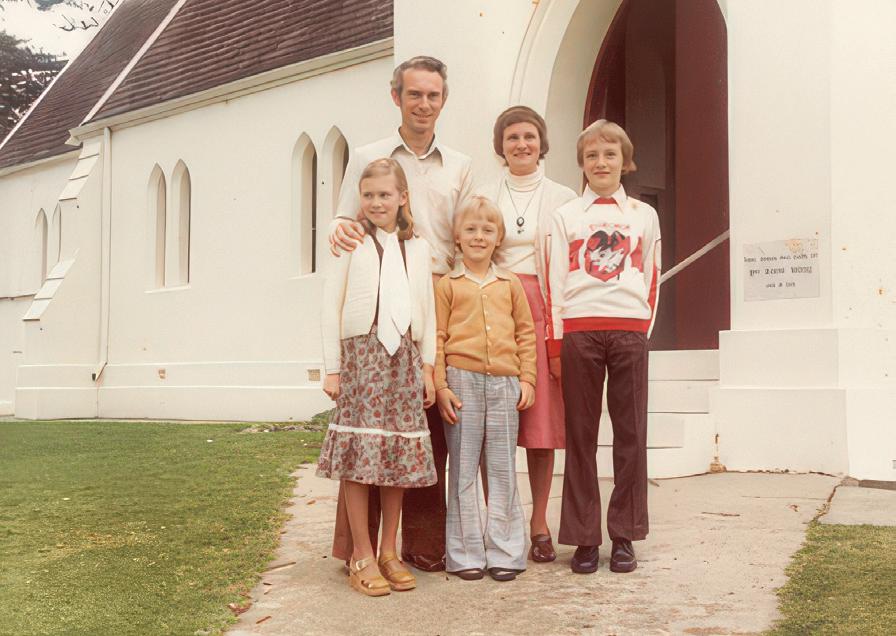
It all happened by accident—or did it?
In 1980, our family moved from Kiama NSW to Temuco in southern Chile to work in Bible teaching with the indigenous people of the area: the Mapuches. A Bible training course already existed, but we took some Preliminary Theological Certificate (PTC) notes with us in case they came in handy. PTC was never far from our minds as Grahame had been involved with Impact Books and Moore College External Studies while studying at Moore (1963-1966), and he had taught PTC in Kiama for 12 years.
were translated. PTC then spread more widely throughout Chile for ministry training, enrolments growing steadily until our return to Australia for our children’s education in 1987.
We returned to Chile at the beginning of 1993, but not to Temuco: we went to Viña del Mar in the centre of Chile to work in theological education for the whole country. We arranged for the
◂The Scarratt family in Kiama in 1980 preparing to leave for Chile.
▾ Below Top: MOCLAM Group Mexico City, Mexico; Below Middle: MOCLAM Group in Mendoza, Argentina; Below Bottom: MOCLAM Group Santiago, Chile

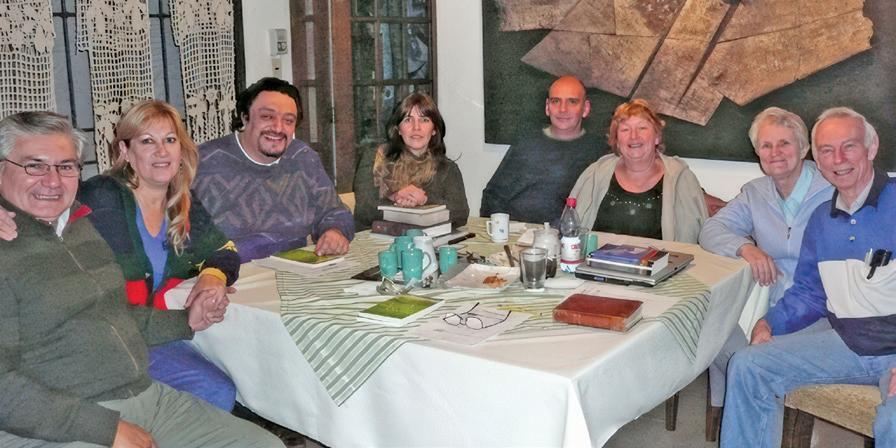








In 1982, a young Chilean by the name of Enrique Lago was sent from Santiago to train with us. Enrique was about to finish the basic Bible training course and was looking for further studies. We showed him the PTC notes and he chose to use them for training. In 1983, we had some courses translated into Spanish for this class of one, but soon after, a few more people joined us. Moore College approved our use of PTC in 1984, after which more courses

translation of all the PTC courses into Spanish, and large numbers of Chileans of all ages started studying the Scriptures. By 1997, in our church of about 200 members, about half were studying PTC. And it didn’t stop there.
Around 1999, at the annual pastors’ conference in Santiago, a deaconess from Buenos Aires in Argentina who knew of Moore College requested to study PTC in Spanish. We agreed, but due to the cost, we sent the courses digitally via email. What followed was a series of requests from different countries— Mexico, USA (Fort Worth), Bolivia, Cuba, Guatemala and Spain. Thus MOCLAM (which used to stand for “Moore College in Latin America”) was established around the turn of the century. Then in 2008, after a chance meeting, the General Secretary of IFES (International Fellowship of Evangelical Students) in Latin America invited us to Panama to attend a meeting of the Latin American IFES leaders. That opened opportunities for MOCLAM to spread across the entire continent.
It’s amazing what happens by chance—or is it? Our God is sovereign and organises circumstances according to his purposes. He used us as his servants in that particular time and place to serve the Latin American church. Using PTC and establishing MOCLAM was his project, not ours. M M
Grahame Scarratt graduated from Moore College in 1966.

WPeter Jensen in conversation with Grahame and Patty Scarratt, see the full interview here: moore.edu.au/100ministry-stories/

Peter Sholl / CMS Missionary in Mexico (2009–2020); Currently International Director of CMS
hen Sarah and I arrived as CMS missionaries in Mexico in 2009, my long-term task was clear: learn Spanish, get to know Latin American culture, and see what I could do to grow the ministry of MOCLAM beyond the solid base that had been established in Chile. As I started those tasks, one thing quickly became clear: to do any of that, relationships were key. Whether it was learning the subtleties of using the subjunctive correctly or understanding why pastors thought the way they did about theological education, getting to know people, spending time with them and learning to love them was critical.
I attended a lot of churches, conferences and camps around the region, and listened to many talks and seminars. As my Spanish improved, I started to interact and contribute to those conversations. I also started to teach MOCLAM courses, which allowed me to familiarise myself with the wonderful depths of the PTC material, but also to think further about how this material might be applied in a Latin American context.
I was continually reminded that reading the Bible as a whole book with Jesus as the focus was a new concept for many of my students, so I spent extra time talking about timelines, the promises of a loving God and the fulfilment of his promises in Jesus. I also needed to think about the educational context in which MOCLAM students had been formed, as critical thinking and essay writing skills were not the norm. This led to the provision of
additional materials, like workbooks, tutorial videos and online quizzes. These materials, along with the personal style of classes offered, meant that teaching was more effective, while also allowing greater time for personal interaction and involvement in the lives of students. Through teaching classes and participating in other activities, like preaching workshops and student conferences, I was given many opportunities to show how God’s love for his people is present throughout the whole Bible and is ultimately focussed in the death and resurrection of the Lord Jesus. However, there is no question that I received from God’s people throughout Latin America just as much challenge and encouragement to understand God’s love as I offered to them. I was encouraged regularly by my Spanish-speaking brothers and sisters’ reliance on God and by the reality of his love in their lives. Their desire to live for him and share his love with their communities in their evangelism and service was often a real challenge to me. And so, even though I was the one encouraging and teaching them PTC material, we grew together.
Now that I’m back in Australia, I think about ministry questions regularly with this extra lens for reflection. I’m excited to hear what God is doing through MOCLAM in the Spanish-speaking world and through the PTC program all over the globe. M M
Peter Sholl graduated from Moore College in in 2002 and 2008.
Adrian and Anita Lovell / CMS Missionaries in Bolivia

“ IN RECENT YEARS, WE HAVE WITNESSED A CHANGE: RATHER THAN BEING SEEN AS A MISSION FIELD, LATIN AMERICA IS NOW ACTIVELY SENDING OUT MISSIONARIES INTO THE WORLD.”
TFor the love of Christ compels us, since we have reached this conclusion, that one died for all, and therefore all died. And he died for all so that those who live should no longer live for themselves, but for the one who died for them and was raised.
(2 Cor 5:14-15)
oday, 20 per cent of Latin Americans identify as evangelical, compared to only 3 per cent in the 1960s. Growth has been fast, and leaders have emerged with admirable enthusiasm, a sincere desire to reach the lost and a deep love for God’s people.
However, while this statistic sounds impressive, only a very small percentage of pastors have been given the opportunity to undergo formal theological training. Some estimates suggest that it’s a mere 5 per cent. Unfortunately, this has exposed the church to false teaching, like the so-called prosperity gospel and
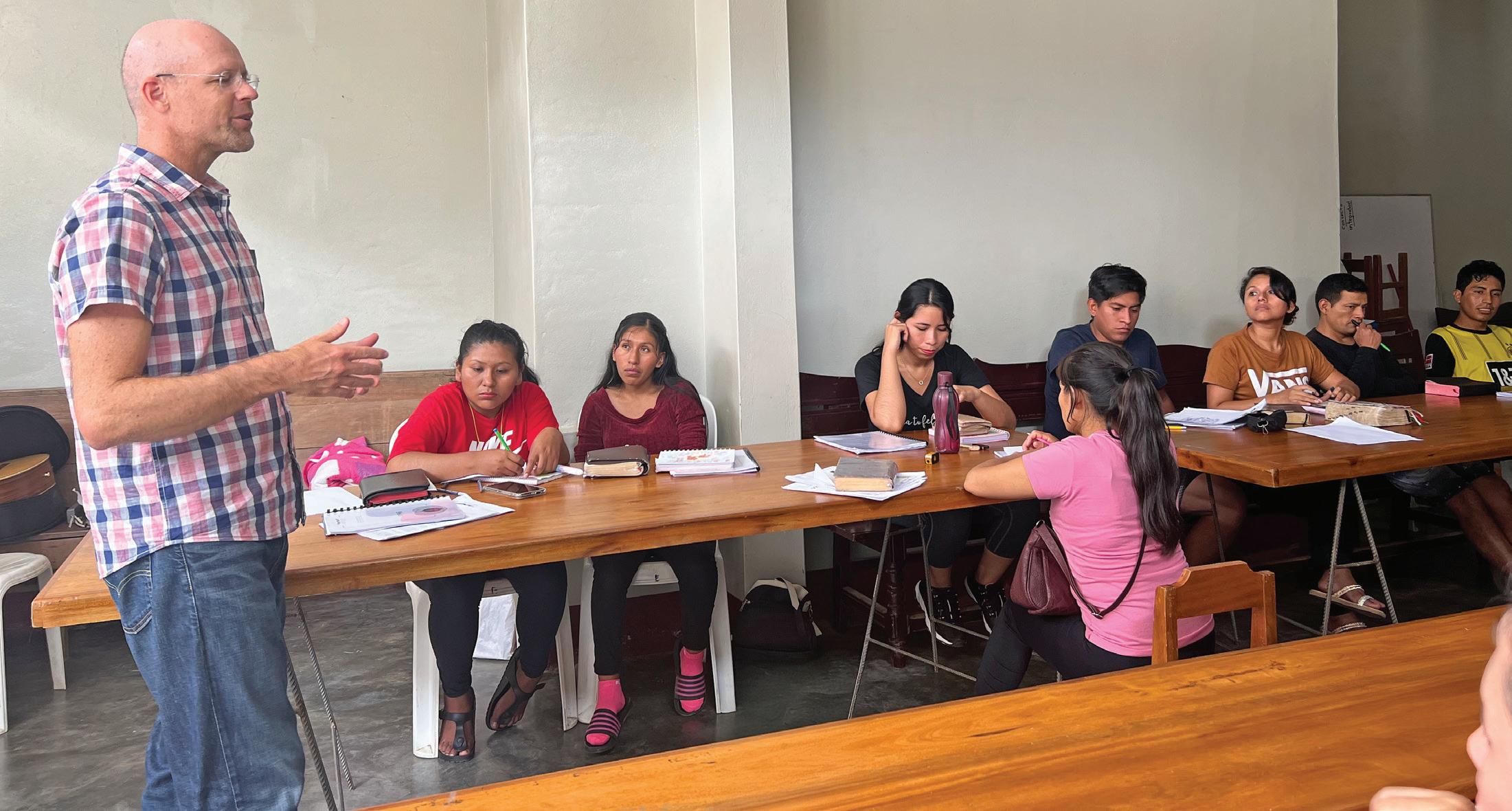
legalism, which burdens believers with an unattainable and prescribed obedience.
Even so, the growth of the evangelical church across Latin America raises an exciting challenge. In this climate, God is using MOCLAM to offer something unique. MOCLAM trains Christian leaders to grow in their knowledge of God within the framework of biblical theology. By reading each part of Scripture through the lens of God’s unfolding salvation plan, false teaching is disarmed and believers are set free to serve, responding to Christ’s love. This in turn creates a desire in them to know God better and love him more.
Now in its fourth decade of existence, we see God at work through MOCLAM. In recent years, we have seen God strengthen his people in university ministries in Chile, Argentina, Mexico and Spain, where MOCLAM courses are being used to train up student and staff workers. We’ve also seen God stretch the use of MOCLAM to new fields, such as university ministry in Uruguay.
Furthermore, God is using MOCLAM to strengthen theological training for specific purposes: some denominations, such as the Anglican Church in Bolivia, Peru and Argentina, have chosen to use MOCLAM to train their leaders theologically. We’ve also seen different churches use MOCLAM to train their people, such as an Assemblies of God church in the Canary Islands. Enquiries regarding the courses are constant and come from a diverse range of countries.

They reflect the need for theological formation among Christian leaders in the Spanish-speaking world, and the understanding that loving God and his people means knowing God better.
In recent years, we have witnessed a change: rather than being seen as a mission field, Latin America is now actively sending out missionaries into the world. We have seen this rise in Latin American missions firsthand in Adrian’s involvement with a Bolivian-run missionary training school. Young people commit to three years of intensive theoretical and practical mission training, with the first six MOCLAM subjects forming the theological foundation of their training. Adrian teaches one subject every six months in an intensive format, and his students continue to demonstrate great enthusiasm for gospel ministry. They are courageous in taking the gospel to people groups that are geographically and culturally isolated, and where the barriers to entry for foreign missionaries are high.
Their enthusiasm and courage flow from their genuine love of God. What they lack is the ability to pick up their Bible and understand and apply what they read in its literary and biblical
context. This is the skill that MOCLAM teaches, and it shapes both them and their ministry. As God uses MOCLAM to train up missionaries, the impact is seen not only in Latin America, but further abroad.
After completing the Ephesians subject, one student, reflected, “Something that surprised me in the course is that everything is ‘in Christ’. God loved us ‘in Christ’. We can’t do anything to earn God’s grace. It can only be found ‘in Christ’. Salvation doesn’t depend on our actions, but on God’s. This is tremendously wonderful, and because of it, we must give God the glory for all eternity.”
Under God, MOCLAM continues to be strengthened and stretched as a tool for God’s people in the Spanish-speaking world. But there are many more opportunities than we have the capacity to pursue. We pray that God will provide more workers to accompany and equip Latino Christians as they preach the gospel faithfully and take it to new fields. M M
Adrian and Anita Lovell graduated from Moore College in 2009. Adrian currently serves as the International Director of MOCLAM.
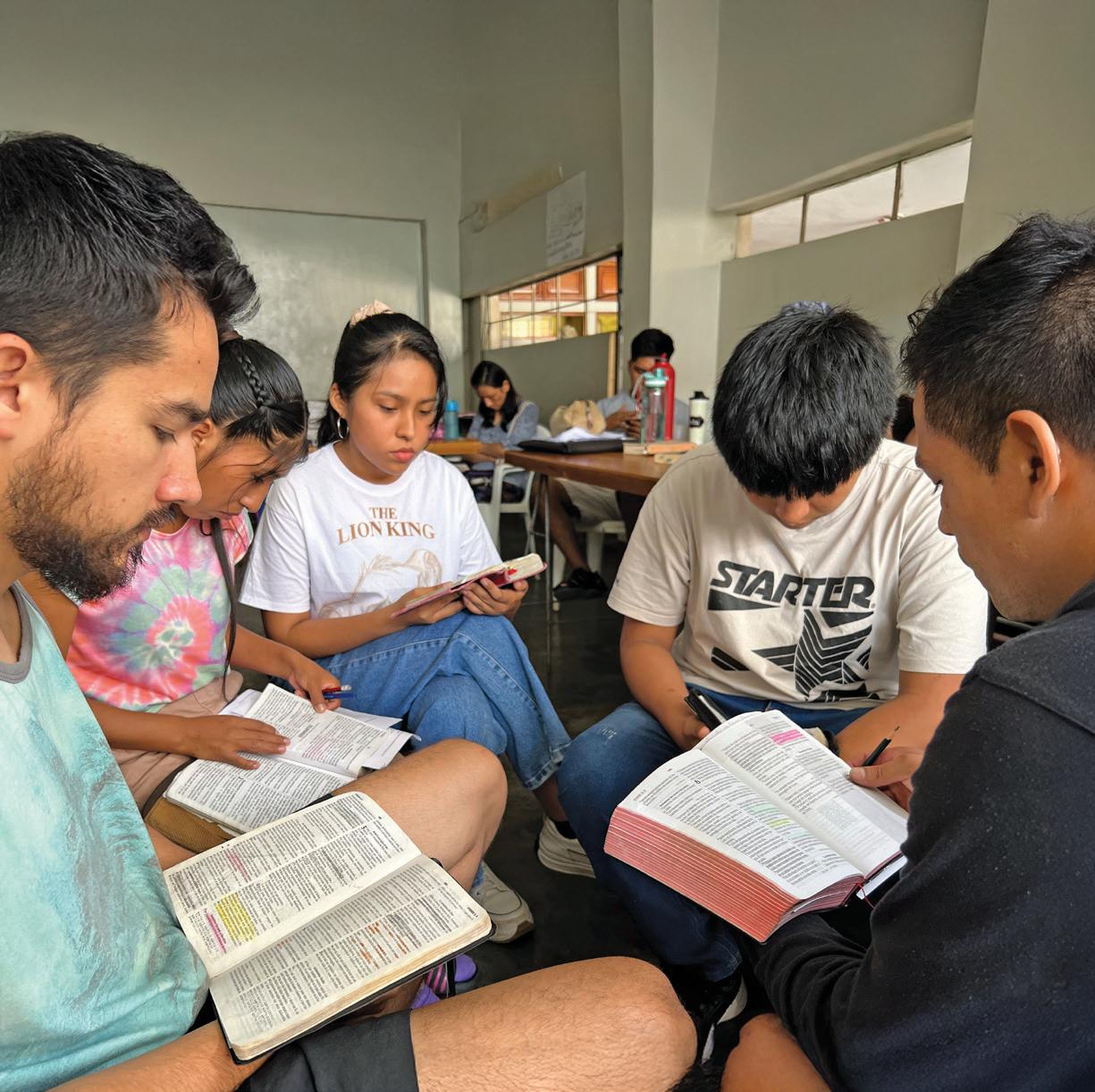
▴ The work of MOCLAM is transforming lives, students reflect: “Something that surprised me in the course is that everything is ‘in Christ’”.
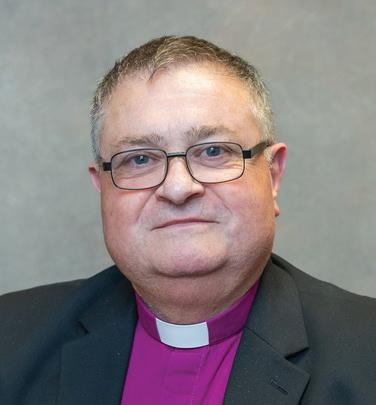
A personal story of how PTC has transformed a national church.
“My dream is that in the coming years, many Chilean Anglicans [would] be passionate about the Word of God, and I believe that in that sense, MOCLAM is the best and most solid instrument we have right now to do that work.”
Through the QR code meet the current Primate of Chile, Most Rev. Enrique Lago Zugadi and hear of his, and his country’s, journey with the PTC and MOCLAM.
A wonderful story of God’s faithfulness which has resulted in transformation in Christian communities across the globe.
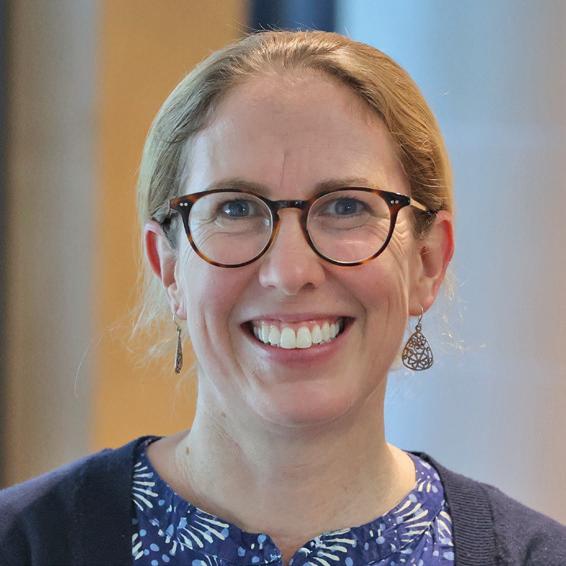
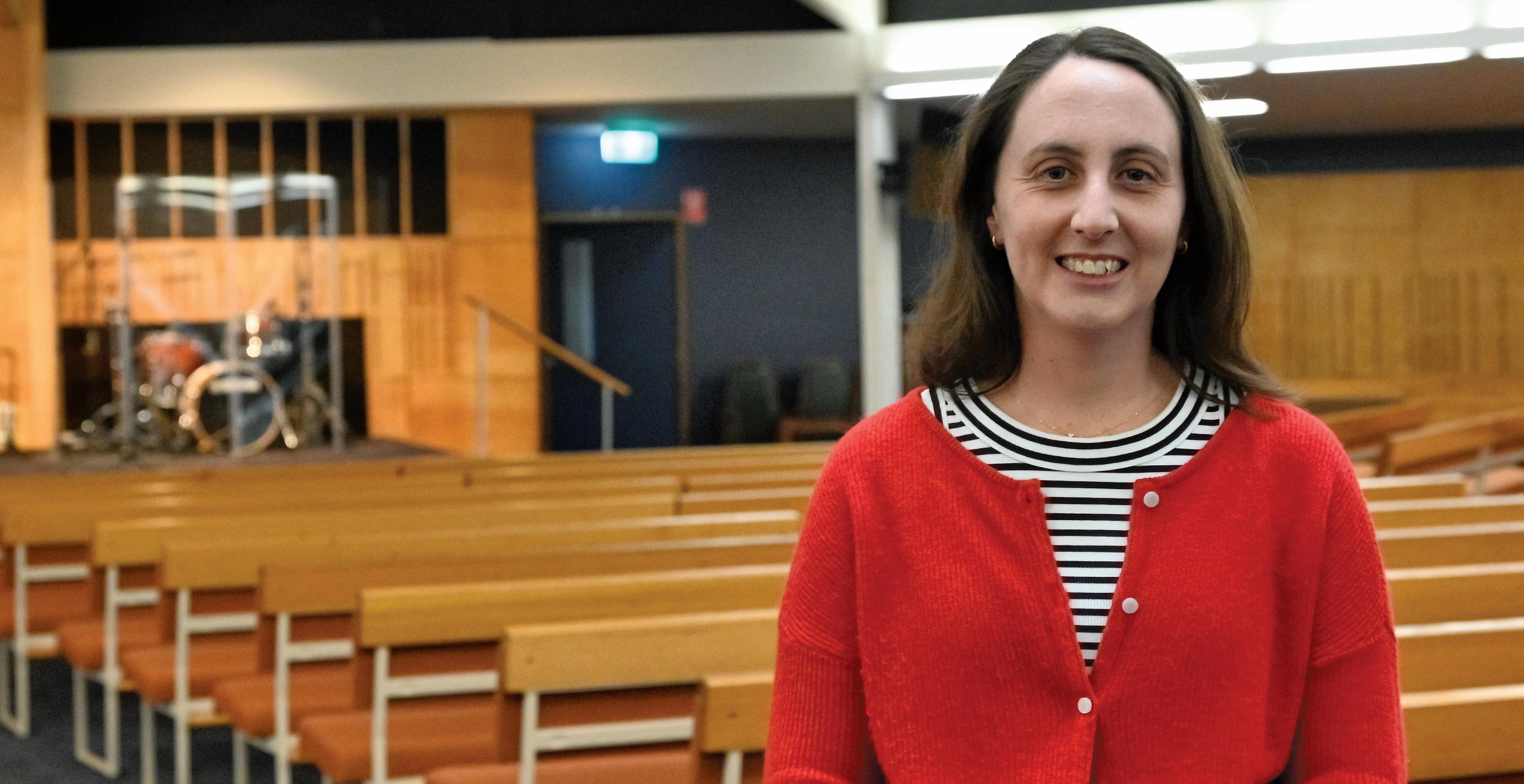
Loane
“GREET PRISCILLA
AND AQUILA, MY FELLOW WORKERS IN CHRIST JESUS, WHO RISKED THEIR NECKS FOR MY LIFE, TO WHOM NOT ONLY I GIVE THANKS BUT ALL THE CHURCHES OF THE GENTILES GIVE THANKS AS WELL.” ROMANS 16:3–4.
One of the great joys of being the Alumni Officer at Moore College is hearing the stories of graduates as they serve faithfully in long-term ministry. It has given me a real sense of how their time at Moore has prepared and equipped them for the work the Lord has for them to do.
I wear two hats at College-alongside my alumni role, I also serve as a chaplain. This means I get to witness firsthand the thoughtful and prayerful work our Faculty do as they train the next generation of gospel workers. Recently I have been particularly encouraged by the way the Faculty are preparing women to serve the Lord with their whole lives.
Moore runs a number of optional subjects specifically designed for female students. Faculty member Veronica Hoyt describes them this way:
“I think it’s really beneficial to have a number of subjects here at College that are just for women.
I think it’s a safe space for them to explore these subjects, but it’s also a way for them to grow in their understanding of what women’s ministry might look like.”
Last semester I had the opportunity to assist Veronica in marking assessments for the Influences on and Issues for Australian Christian Women subject. This subject did not exist when I studied at College, but I really wish it had! It covers topics like feminism, identity, sexuality and work.
As part of their assessment, each of the women prepared a talk on one of the issues, exploring how it interacts with a Christian woman’s identity. I was deeply struck by the way each of these women was able to think biblically and theologically about such complex issues. They grappled with how they affect Christian women today and translated their thinking into engaging and pastorally insightful talks. I saw firsthand the way the subject had grown their ability to interact wisely and winsomely with the world around them.
Chatting with Veronica about how the students found the subject, she shared with me:
“Responses from the students have been positive. They engage well in class, ask good questions and think deeply. I’ve really loved seeing them wrestling from a theological and biblical perspective with the different topics that we cover, some of them very confronting. This results in them having a better grasp of our Australian context and how live in it thoughtfully and faithfully as Christian women. It’s wonderful to see them grow in confidence
to minister in a way that they might not have been able to before they’d done the course.”
In second semester, another bespoke unit for women is offered, Christian Women in Australia. This unit addresses issues like grief, death, body image, menopause and domestic abuse.
Graduate Lauren Dewhurst, now serving as Children’s Director at Christ Church St Ives, reflected on the subject:
“It was a beautiful opportunity to get lots of pastoral skills under your belt. We looked at topics like death of a child and death of a spouse. We looked at the idea of body image and miscarriage, and I think things like that are just so good to have - a toolbox of skills and biblical knowledge that you can pass to people, to care for them effectively having already thought about some of the theology behind it. I thought that was so equipping for me for the ministry that I’ll do ongoingly.”
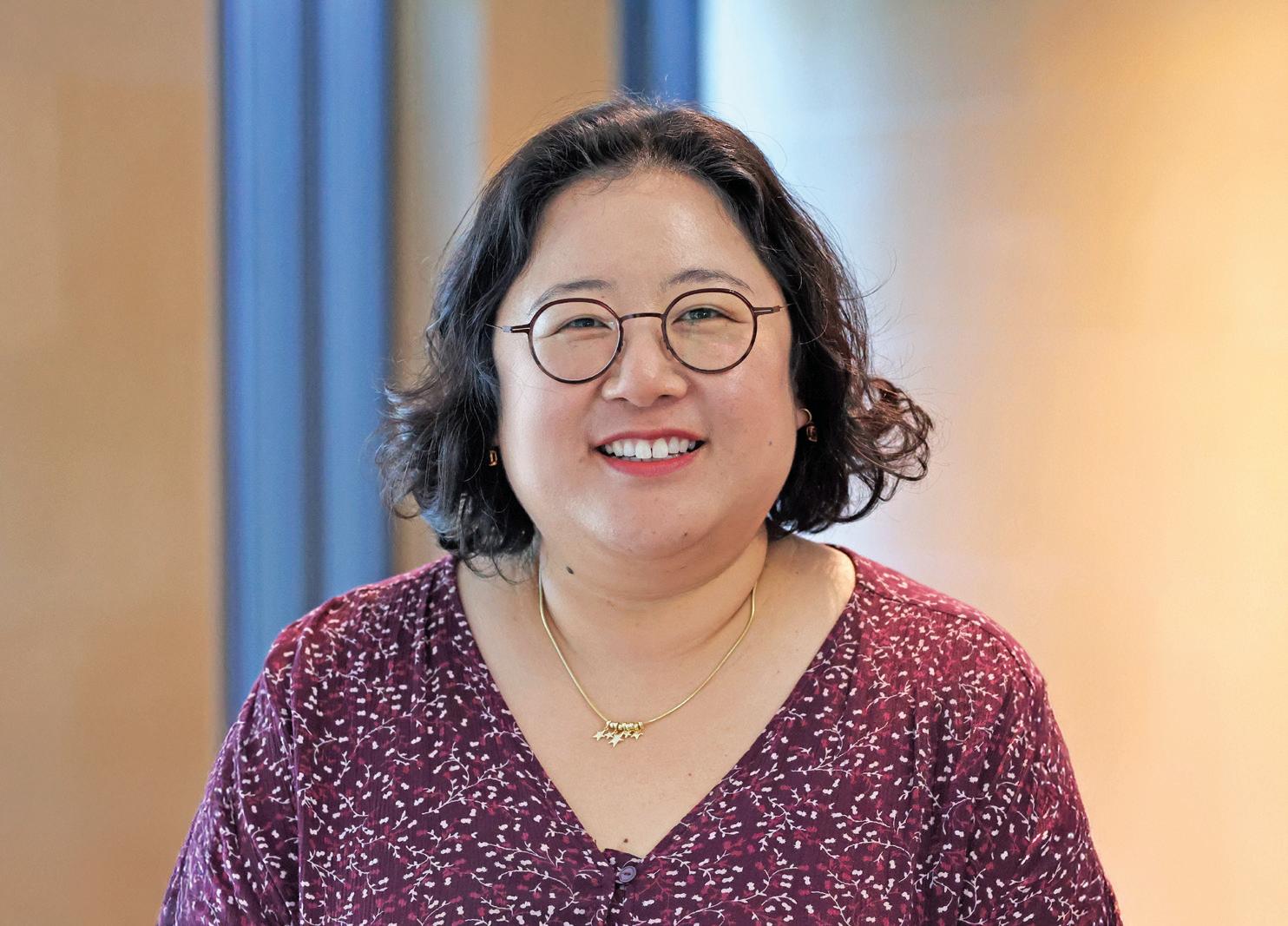
Susan An, our Dean of Women, is passionate about equipping women for ministry. Having served in parish ministry herself prior to beginning her role at College, she is convinced of the value of women on ministry teams. She shared:
“I think having theologically trained women on a staff team, where they are actually able to understand the issues and the temptations that modern women face within society, can be really invaluable.”
Something that has struck me at College is this priority for raising up men and women to serve together in gospel partnership. The conviction that we need the unique contributions of both men and women in proclaiming Christ is clearly evident in how the Faculty approach the task of preparing people for ministry.
As Susan puts it:
“Our College really values training and equipping women to serve the Lord Jesus for a lifetime. College is kind of filling up your theological tank for the next 50 years, in a very short period of time. And time and time again,
we’ve seen the value of having women come and train theologically and the contributions that they make in whatever ministries that God happens to send them on.”
I have been so encouraged to watch dozens of women be raised up and sent out over the last few years. These are women who love the Lord deeply and have been profoundly shaped for a lifetime of serving him by their time at College.
Lauren’s story is a particular encouragement to me because of a costly decision she made. Lauren began studying the Diploma in 2012, doing it part time while serving in ministry. After finishing, she continued in ministry and was involved in sending apprentices to College. After 6 years she says she realised “I want to do what they’re doing!” So, she paused her job and enrolled full time to complete her Bachelor of Theology. Reflecting on that experience she says:
“I feel like I was so enriched and nourished in my faith and in my relationship with God at the same time, I got to know him better and I got to delight in who God is and what he’s done for me. The treasures of the knowledge were just so profound, and it was like a beautiful gift to me. Having done ministry, I could see what every class was for, I could understand why they were teaching this because I’d lived trying to explain the concepts before, but now I just knew them better.”
This is the kind of ministry you are making possible through your prayers and giving. When you give to Moore College, you are filling the theological “tank” of women like Lauren for the next 50 years of service to Jesus. You are enabling them to step into churches, schools, and communities all over the world—grounded in Scripture, equipped to proclaim Christ, and ready to love God’s people. M M
But the need is still great. Our churches demand more women grounded in theological study, honed by years of studying in community and ready to effectively serve to congregations with high proportions of women and children.
More women are ready to come, to be trained, to serve. Will you help us equip them?
Your partnership in our Spring Appeal will ensure more women are prepared for a lifetime of gospel ministry—serving alongside men as coworkers for the sake of Christ.
Thank you for your partnership in this vital ministry.
give.moore.edu.au
MooreID
Title Given Name
Family Name Address
City
State Postcode
Phone Email
Yes, I want to prepare gospel workers by giving:
$1200 $600 $120 $60
Other $
Once Monthly
to prepare men and women to proclaim the gospel of Jesus Christ in Sydney, Australia and across the world.
I would like to make my gift by:
Cheque (payable to Moore Theological College)
Direct Deposit (contact us*)

Are you part of the next generation of theological leaders?
Moore College has the academic rigour, outstanding resources and a Faculty who will share the journey with you.


“The College was always challenging me - how was my research going to have meaningful impact for ministry and the local church.”
Kamina Wϋst, PhD Graduate 2022
“The thing that made Moore so appealing was the community of lecturers, staff and students to support me through the process.”
Martin Robinson, PhD Graduate 2023
Find out more about doing a PhD with Moore College
moore.edu.au/phd